#jjk meta
Explore tagged Tumblr posts
Text
Gojo Satoru visiting Kugisaki nobara while she is in coma, sitting next to her, and talking to her. Gojo Satoru swapping souls with Yuta okkotsu, teaching him everything he knows about his cursed technique. Gojo Satoru hiding Sukuna's last finger to indefinitely postpone Yuji's execution. Gojo Satoru who bore the burden of being a monster, killed all the higher ups alone because he refused to let his students watch such gruesome sights. Gojo Satoru who believed he would win right til the end. Gojo Satoru who died knowing his students had got it from there, that they would be able to save Fushiguro Megumi. Gojo Satoru who let his body be used as puppet after his death. Gojo Satoru who died knowing all his students would be saved.
#satoru gojo#my love my heart my blue eyed princess#jujutsu kaisen#jjk#gojo satoru#best teacher gojo satoru#gojo satoru meta#jjk meta#jjk manga#jjk 266#jjk 267#jjk manga spoilers#kugisaki nobara#yuta okkotsu#inumaki toge#fushiguro megumi#itadori yuuji#jjk trio#jjk leaks#jjk spoilers#gojou satoru#jjk gojo#gojou#satoru gojou#jjk nobara#nobara kugisaki#jujutsu kaisen spoilers#megumi fushiguro#itadori yuji#character analysis
4K notes
·
View notes
Text
the op of jjk season 2 is rife with symbolism. there's one particular motif, however, that foreshadows the trajectory (and tragedy) of gojo and geto's love story.

almost immediately, we see geto running through the rain. the stylistic choice to portray him holding his bag over his head is deliberate, because it emphasizes what he conspicuously doesn’t have but so clearly needs: an umbrella.

gojo, on the other hand, is not operating with the same sense of urgency, seen through him taking his time looking at a cat. gojo has what geto needs, but he's not rushing. their behaviour is incongruous; geto is hurrying to get out of the rain, and gojo remains still, because he’s absolutely not hurrying at all.

the sense of urgency is compounding, seen through geto bouncing his leg. he’s waiting impatiently in the rain, and he's not using his bag to cover up his head anymore. geto knows gojo is coming; that's why he's impatient— because he's waiting for someone who has what he needs that hasn’t shown up yet.

geto needs him, yet gojo doesn’t pick up the pace. this is despite the fact that he needs to because it’s raining and geto doesn’t have an umbrella. we, as the audience, feel geto's impatience and we're urging gojo on, yet he still doesn't go any faster.

sharing an umbrella is an established trope in japan. it’s widely recognized and practiced enough to have its own designated terminology.

gojo is bringing an umbrella for them to share. that's why it’s repeatedly reinforced to the audience that geto doesn't have one. that’s also why the shots cut between them; it highlights what gojo has that geto doesn’t, and in doing so, ties the narrative together through the umbrella.
by the time gojo finally shows up, the sun has come out. gojo lowers the umbrella and smiles sheepishly, rubbing the back of his neck. contrarily, geto almost seems resigned, like he’s accepted the fact that gojo took too long. they can’t share the umbrella anymore because they missed their chance to use it.
we can see that geto is saying something to gojo when he finally shows up with the umbrella. you know what i would bet actual money it probably was?
“you’re late, satoru.”
#my jjk meta#satosugu#stsg#stsg angst#satosugu angst#gojo satoru#satoru x suguru#gojo x geto#geto suguru#satosugu analysis#jjk meta#jujustu kaisen#jujutsu kaisen angst#jujutsu kaisen analysis#satosugu meta#gojo meta#gojo analysis#jjk angst#jjk analysis#geto x gojo#goge#gego#jjk season 2#jjk#stsg brainrot#satosugu brainrot#stsg meta#gojo angst#this will be the first of many meta posts to come#i will flood all of ur dashes
4K notes
·
View notes
Text
Satoru’s eyes literally any other time in the anime:


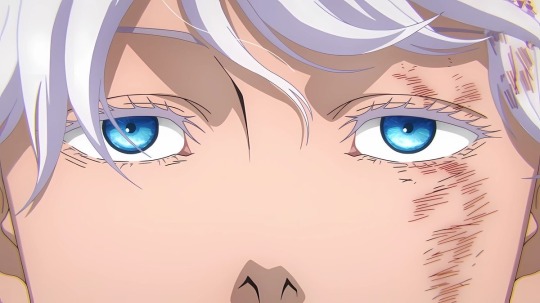
bright, shiny, controlled
Satoru’s eyes the moment Suguru was leaving:

dark, dull, panicked
#i had never ever seen his eyes like that before#that was literally the one time they looked so…stormy?#good god#satosugu#satosugu meta#jjk meta#jujutsu kaisen#jjk#gojo satoru#satoru gojo#stsg
22K notes
·
View notes
Text
"Gojo should've gotten to live as a person-" THAT’S THE POINT. That is the ENTIRE point of JJK. Every single character who died was someone who "should've gotten to" do a lot of things. Riko should've gotten to live for herself, Geto should've had the chance to be a teenage boy given support and safety, Junpei should've gotten to live without fear, Nobara should've had the chance to let people in without fear, Nanami, Yuki, Mai, Higurama, EVERYONE.
Here's the thing, Gojo is on this list. Gojo isn't the exception because JJK at its core is a story about how overarching systems destroy people; bullying, capitalism, sexism, etc. And this system does not need people to run it. Which is why killing Kenjaku didn't stop shit because yeah he started this mess but its grown beyond him. Fuck, it was there before him.
This is also why despite Sukuna & Uraume being the only ones who are actual threats, nothing is better. The cast got rid of the higher-ups, jujutsu tech as it is, is no more. The major families are dismantled. This should be a victory. This is what the Sashisu gen pointed out as the problem but things have never looked more bleak.
Why? Because the problem isn't Kenjaku, Sukuna, curses, sorcerers or curse users. It's the existence of Cursed Energy itself. This has been pointed out multiple times by Yuki. Its the system and Gojo has been complicit to the system for a long, long time. He's also it's victim. Gojo says he's the exception a lot, but as everyone has rightfully pointed out, he was nothing more than a weapon to jujutsu society.
JJK has followed a very clear pattern to every character right from Geto to Junpei to Riko; characters are representatives of systems of suppression, and they will not escape it. I can't recall a single character that's escaped unscathed, much less alive.
Is it disrespectful? Yes. Is it demeaning? YES. There has not been a single character death that's been dignified in JJK. It's all on a scale of bearable to absolutely horrifying. It is genuinely wild seeing people resort to threatening the author AGAIN. Calm the fuck down. You are entitled to feeling upset about how Gojo has been treated but Yuta stans are being calm despite Yuta arguably suffering the "he is a weapon" thing WORSE. It's still a fictional character and JJK's narratives never treated Gojo with any exceptions despite the character saying otherwise.
#gojo satoru#jjk#jujutsu kaisen#jjk meta#jjk 261#satoru gojo#jjk manga#i really like gojo and appreciate his character btw#and i made my peace with 236#i also think we kind of got our answer to geto's question about being the strongest#gojo 100% was forced to give away his body to fight sukuna#but gojo.....isn't his body- isn't his six eyes#in his final moments as gojo satoru-what did he see him as?#we see him in some disembodied form unattached to his body#our kast glimpse of gojo as a oerson is unrelated to his six eyes with a smile
2K notes
·
View notes
Text
the whole story of jjk is a parallel about megumi (the blessed prodigy) and itadori (the cursed finger eater) exist because of gojo (the prodigy) and geto (the curse eater/manipulater), they parallel to each other a lot except megumi shows the signs that he can be saved unlike geto who was too far gone before he could be saved. they fight in the same way, for the same reasons but this time maybe they will break the cycle. walk with me here...maybe itafushi will be the proof that no matter how fucked up the world is and how odds are stacked up against you, there is still a chance that you can change history.
#this is like a full circle moment but we are breaking the cycle of trauma#jujutsu kaisen#jjk#jjk spoilers#gojo satoru#geto suguru#satosugu#stsg#itadori yuji#megumi fushiguro#itafushi#jjk leaks#jjk manga#jjk meta#jjk analysis#400#500#600#700#800
1K notes
·
View notes
Text
Is someone gonna talk about the use of signage in yesterday's episode? Do I have to be the one to talk about the use of signage in yesterday's episode?
I know we all saw the billboard beside Choso displaying the abilities of his technique in tandem with the narrator, but there were so many more great uses of the signs in the background to convey information.
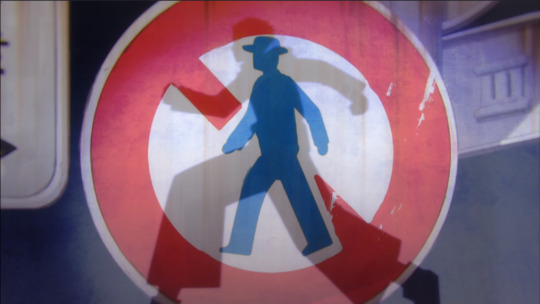
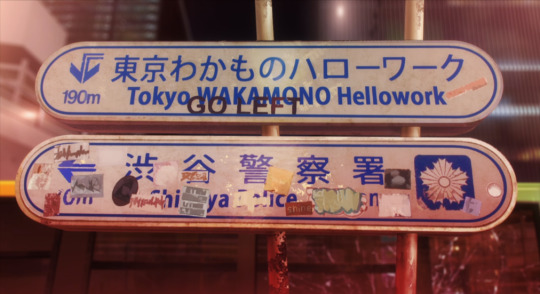
The first sign (and also one of the first shots) that we see in the episode is a Pedestrian Do Not Cross sign overlaid by the sound of Yuuji running, followed by Yuuji's shadow itself taking up the position of the pedestrian on the sign. You can read this as the sign telling Yuuji not to proceed to where he's going or as an indication of how the upcoming fight will end for the viewer.
The next sign that we get is one telling us to Go Left, which doesn't really seem important, but I promise you, it is. We'll see a lot of arrows pointing left throughout the episode and every single one of them is pointing away from danger. Go Left to avoid danger, essentially.
These two signs are arguably the most important in the episode, but they aren't the coolest use of visual symbolism that we got, so lets keep going.

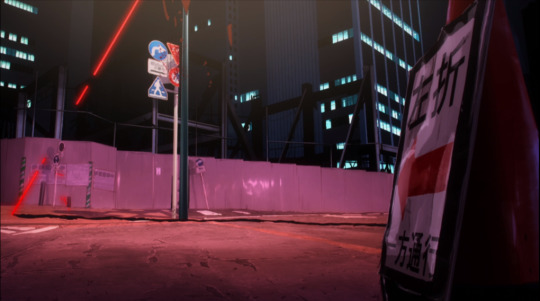
The third sign that we see focused on in the episode is a No Running sign that Yuuji passes that says "Do Not Rush. It Is Dangerous." Yuuji, of course, runs past it on his way toward the escalators that lead (for him) to Gojo and (for the viewer) to Choso.
Once he does get to the bottom of the escalators, Yuuji is attacked by Choso immediately and Choso's opening move (Convergence), once Yuuji moves his arms up and away from his face, slices up through the subway cieling and the road above to cut the Pedestrian Do Not Cross sign that we saw at the beginning of the episode in half.
We also get out first big Left Arrow, placed immediately in the foreground of the shot and pointing toward the aforementioned sign that's been cut in half (this will be important later), but in a another view, it also points away from station itself. Again, go left to avoid danger.
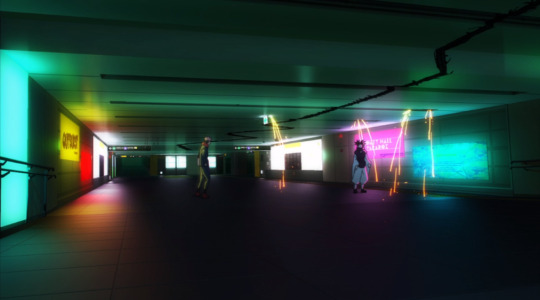

Our next Left Arrow is on the ceiling between Yuuji, indicating that he should go away from Choso. Interestingly enough, it also points toward the bathrooms that Yuuji will go into later once his fight with Choso in the hallway becomes too dangerous.
That same arrow falls to the floor between them once Choso gets mad after Yuuji tells him about Eso and Kechizu crying, this time pointing directly away from Choso.
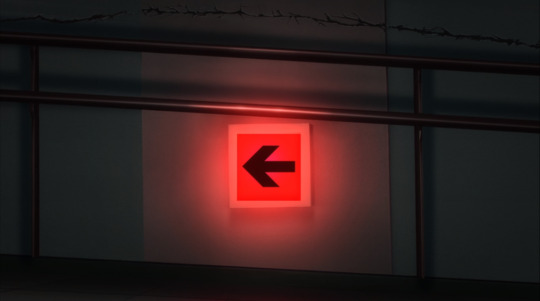
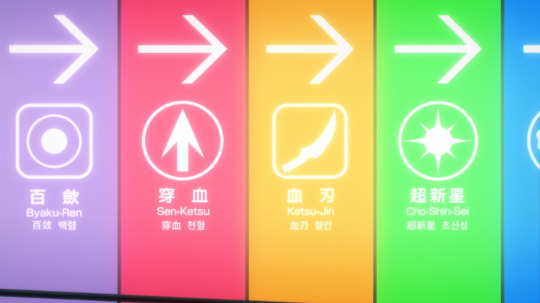
Another Left Arrow, this time in a more urgent red. We see this once Yuuji realizes that he's in serious danger, that he'll loose if he continues to fight Choso in the hallway. It's also pointing away from the bathrooms and toward the escalators from Yuuji's point of view beside the bathrooms, indicating that he needs to leave the area entirely.
The previous arrow pointing toward the bathrooms as a safe option has been destroyed and Yuuji has taken some serious damage by the time he moves toward them. The bathrooms are no longer safe. Yuuji needs to leave.
This is followed up by the only Right Arrows that we see focused on in the epsiode, but unlike the Left Arrows, they aren't used to convey how to get away from danger, but rather what is dangerous. Not only do these arrows all point toward Choso outside of the shot, they also have each of his techniques displayed below them.
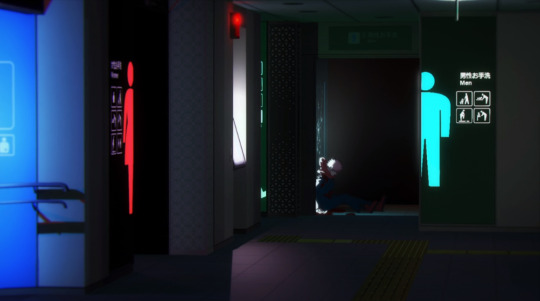
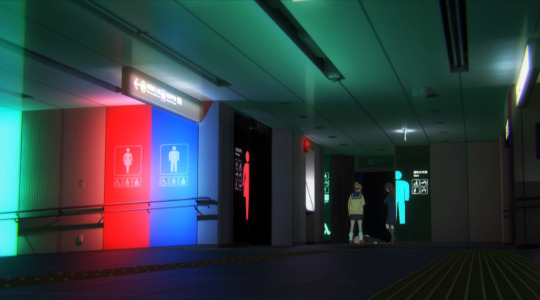
Once the bathroom fight is over and Yuuji is on death's door, we get a zoomed out shot of his body framed by (two) people cut in half. This sign is shown right before Sukuna makes his only appearance in the episode, where we hear the sound of electricity flickering.
We heard this exact sound earlier from the Left Arrow telling Yuuji to get away from Choso at the beginning of the fight, but I like to interpret it as an audio indicator of Yuuji's life and/or control of Sukuna flickering in and out, becoming weaker.
Side Note: In the previous shot of Yuuji that we get before this one, we see a blade of light cutting Yuuji in half, the same way Convergence cut the Pedestrian Do Not Cross sign in half earlier in the episode. This will come into play later in the post, but keep it in mind.
The next time we see these bisected bathroom signs is when Mimiko and Nanako approach Yuuji to awaken Sukuna. Two people framing Yuuji/Sukuna that have been cut, while those same signs are whole in the hallway to the left. Go left to avoid danger applies to the girls here as well.
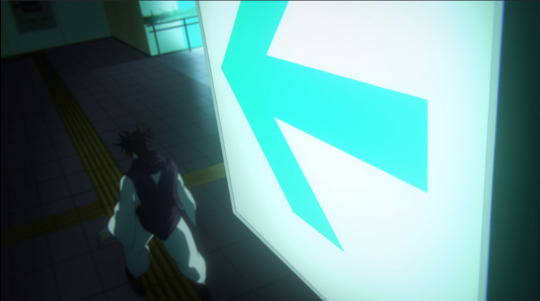
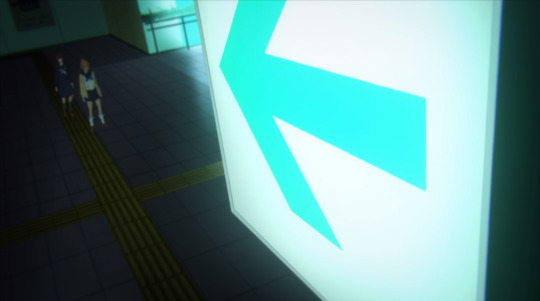
Our next important set of signs are actually the same sign, a large green arrow in the foreground that points away from where Yuuji's body is. While Choso stumbles away from it (away from Yuuji/Sukuna) the girls walk toward it.
This is also the first Left Arrow that we see point toward Choso, unlike the one pointing away from him at the beginning of his and Yuuji's fight. Choso, at this moment and onward, is no longer a source of danger to Yuuji or to us, the viewer.
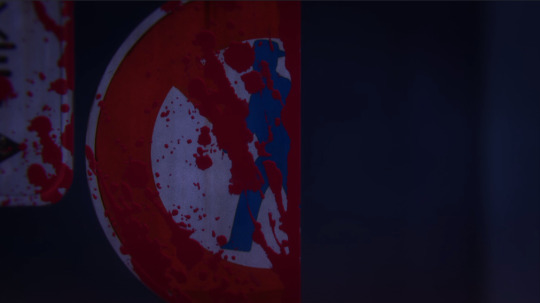
And finally, the final shot of the entire episode, our old friend, the Pedestrian Do Not Cross sign. Yuuji has lost to Choso, the girls have found him to awaken Sukuna, and we get a focus shot of the Pedestrian that previously represented Yuuji cut in half and covered in blood.
I mentioned earlier that we get another shot of Yuuji cut in half by a ray of light in the bathroom.
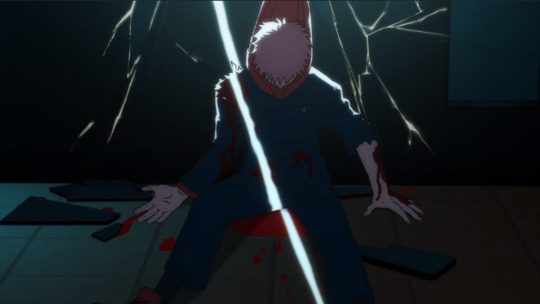
Here is that shot, and the way that I interpret it is as a reminder that Yuuji shares his body. Yuuji's control of his body has been cut off in the same way that the Pedestrian representing Yuuji has had part of it cut away. What's left is the part that Yuuji can't control, the Pedestrian covered in blood.
Additionally, repeated use of a sign showing pedestrians cut in half and bloody can also represent the civilians in Shibuya, especially now that Yuuji no longer has control of his body.
#anywho ty for reading my long post about signs and their meanings in the episode#i was originally going to make this more meme like and shorter#but after going through the epsiode several times i found it more interesting and cool than amusing#signs man. theyre everhwhere#jujutsu kaisen#jjk meta#itadori yuuji#choso#mimiko and nanako#ryomen sukuna#nicos meta
2K notes
·
View notes
Text
Gojo cares a lot, actually
Perspective and empathy in Jujutsu Kaisen
Once again, I see accusations that Gojo only cared about people in relation to their strength. I can't believe that 236 and 261 haven't put this idea to bed already, but let's go over it again for the class. Here are some thoughts on the importance of perspective and empathy in JJK. Spoilers for chapter 266 ahead!
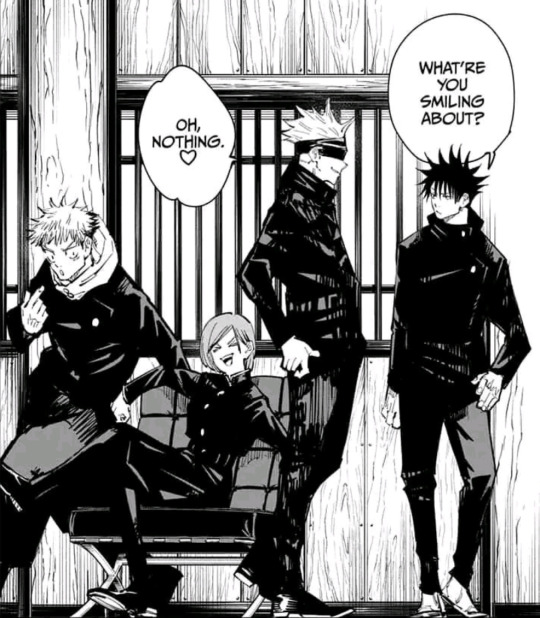
In 236, Gojo tells Geto he loves everyone. This single line, direct from the man's mouth, should be enough. However, moments later, Nanami says, "You never cared about protecting people". So why do some readers only take one of these perspectives at face value?
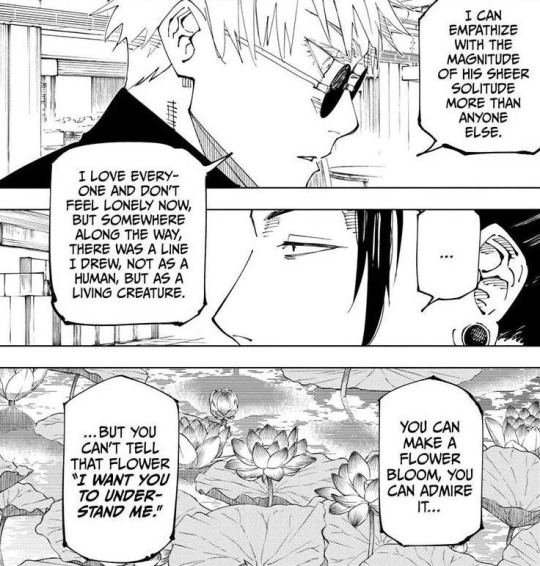
Perspective matters in JJK. Often, characters and even the narrator state things that are only true from their perspective in a given moment. What you choose to believe says more about you than it does about them — an idea I explored in my analysis of 236.
This is particularly important when it comes to Gojo and Megumi, because the moment they meet is the only (?) scene in the whole of JJK that we get to see from two perspectives.
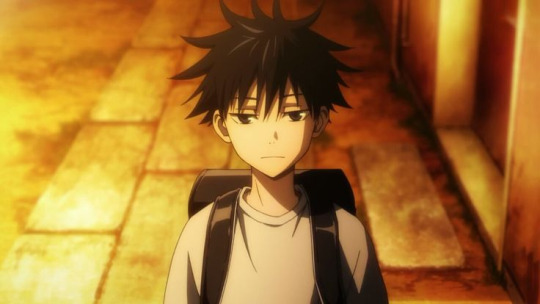

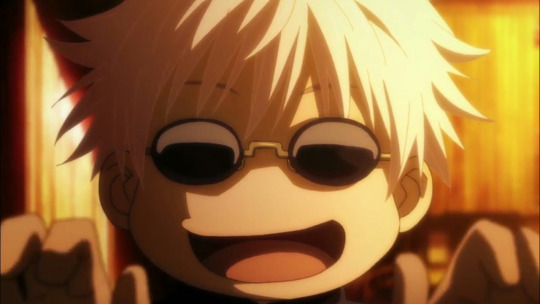
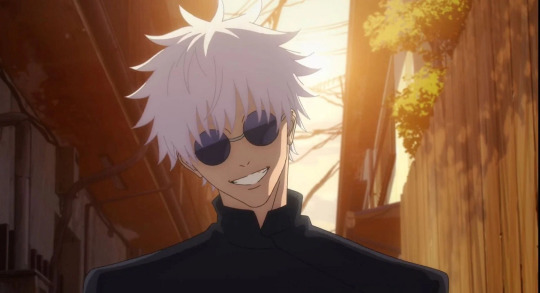
The second time, the reader understands the emotional weight of it for Gojo — but Megumi doesn't. He's kept in the dark, so of course he thinks about their meeting in different terms.
Once again, whose perspective are we going to take at face value? From Megumi's point of view, he wasn't offered a choice. From Gojo's point of view, he extended to a child the little agency available to him.
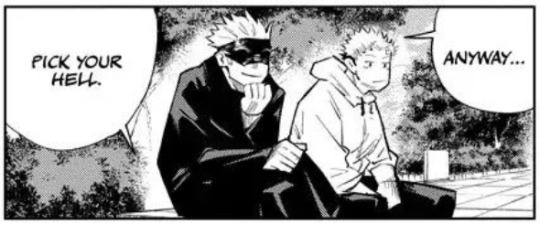
Offering a choice is something Gojo does consistently throughout JJK — pick your hell. It's one of the ways he shows care for others that goes unrecognised, so it's ironic that readers and characters alike misinterpret it for a lack of empathy. However, this is no coincidence.
For much of the series, Gege keeps Gojo at a narrative distance from the reader. Most of what we know about Gojo comes from what other characters tell us, and our view of him is therefore coloured by their perspective.
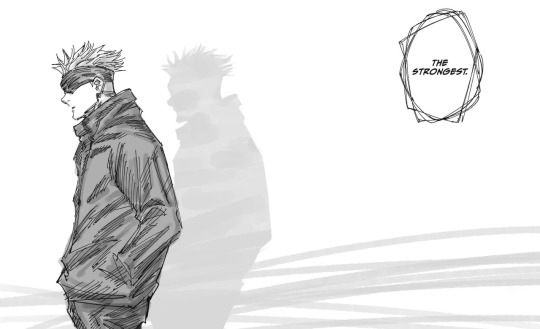
However, while Gojo laments the distance between himself and others, he fails to recognise that he's the one maintaining it — and not because of his strength or his technique. He has admirable goals, but he chooses to work towards them alone.
There are many occasions where characters reach for Gojo, but he refuses to let them past his metaphorical Infinity out of a sense of duty and perhaps misplaced belief that he alone can or should bear this heavy burden.
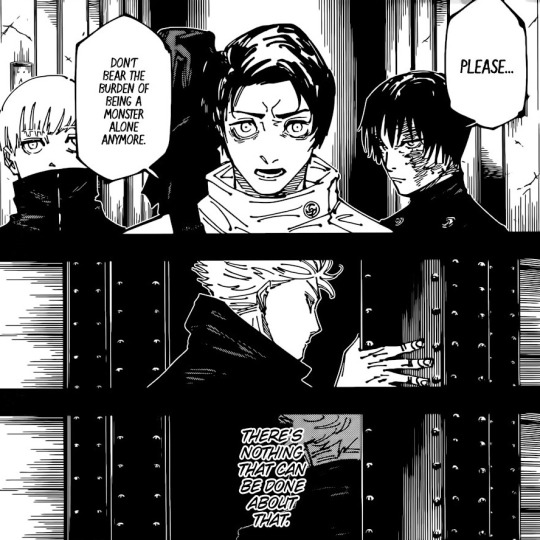
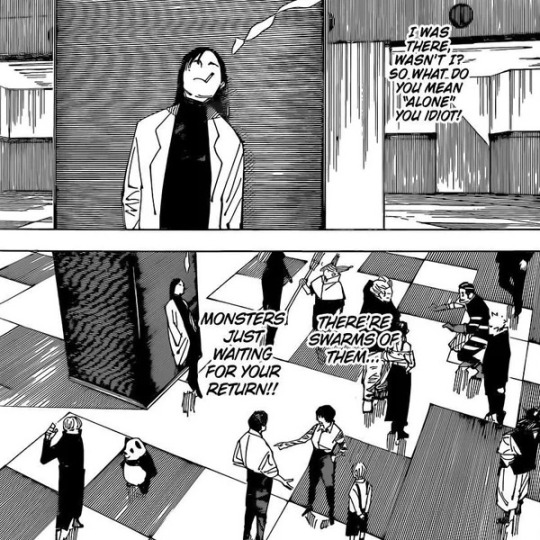
All of Gojo's actions are about preserving the humanity of others at the expense of his own. That's precisely why he chooses to become the "monster" alone. In this way, Gojo is flawed but he isn't uncaring. Again, it's a matter of perspective.
Gojo sees strength as the solution because it's all he's ever known. However, recognising the strength of others doesn't mean that's all he sees — because Gojo knows that dehumanisation acutely. What's more, 261 also suggests he thinks of "strength" in different terms to others.
When they meet, Gojo tells Megumi not to get left behind. However, he later says he was "left behind" when Geto defected. We know Gojo's physical strength eclipsed Geto's, yet Gojo only refers to himself as "the strongest" alone after Geto dies.
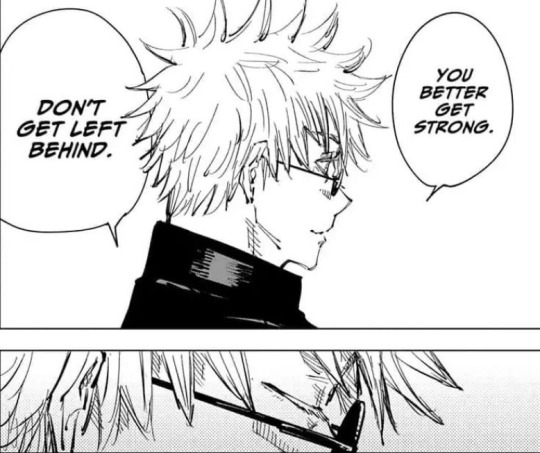
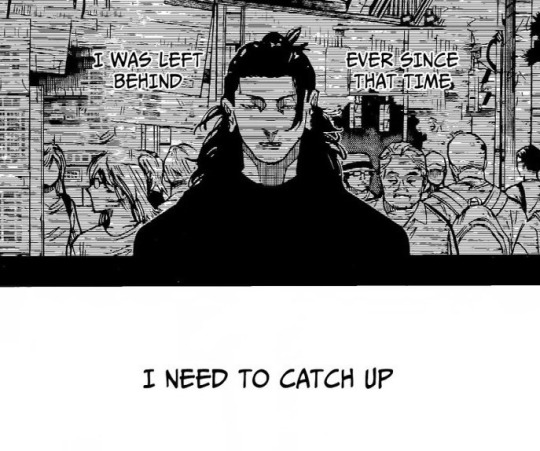
Before that point, there's nothing in the text to suggest that Gojo ever stopped thinking of the pair of them as "the strongest" — as a unit, as a duo. This suggests that strength, for Gojo, is something much more intangible, much more sympathetic, and much more human too.
What do the strongest characters in JJK all have in common? Indomitable will, courage in their convictions, an overwhelming sense of self. Looking at strength through this lens shines a new light on Gojo's goal of raising "strong" allies.
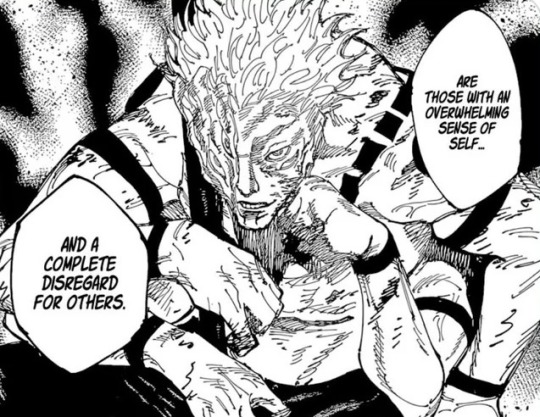
When he forces a third option in Shibuya, Gojo proves that strength doesn't have to come at the expense of compassion. In the later chapters of the Shinjuku Showdown arc, Yuta, Yuji, and the rest of Gojo's allies reinforce that idea ten times over, and I have every belief that Megumi will soon do the same.
To suggest Gojo only saved Megumi for his technique is unfair when he has consistently proven himself committed to protecting the futures of others, even "weak" non-sorcerers who have nothing to offer him. Once again, it's all a matter of perspective.
Gojo's way of caring is still caring, even if it doesn't look familiar to you. His only flaw was closing himself off from others and choosing to care from afar. However, just like Gojo never stopped reaching for Geto after he left, Gojo's allies never stopped reaching for him.
There's a phrase we use to describe looking at things from another perspective: putting yourself in someone else's shoes. I think it's very telling that Gojo's allies have taken that literally — Yuta by stepping into his skin, and Yuji by standing in his place in 266.
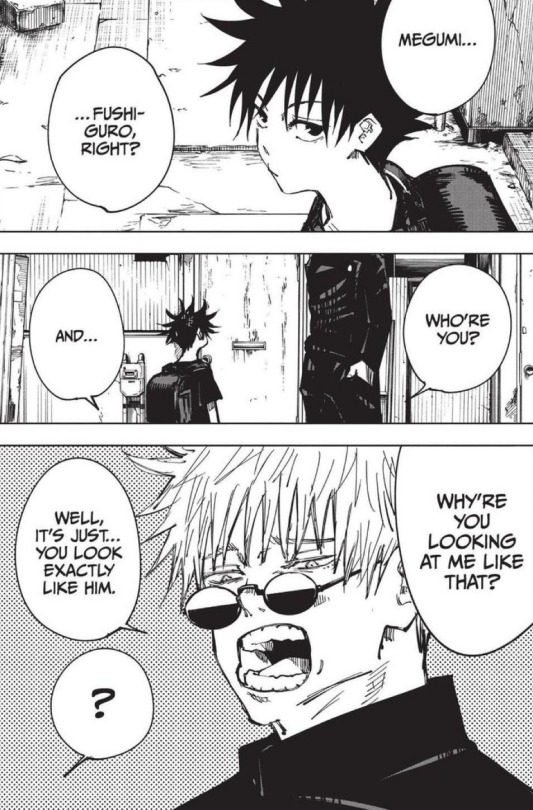
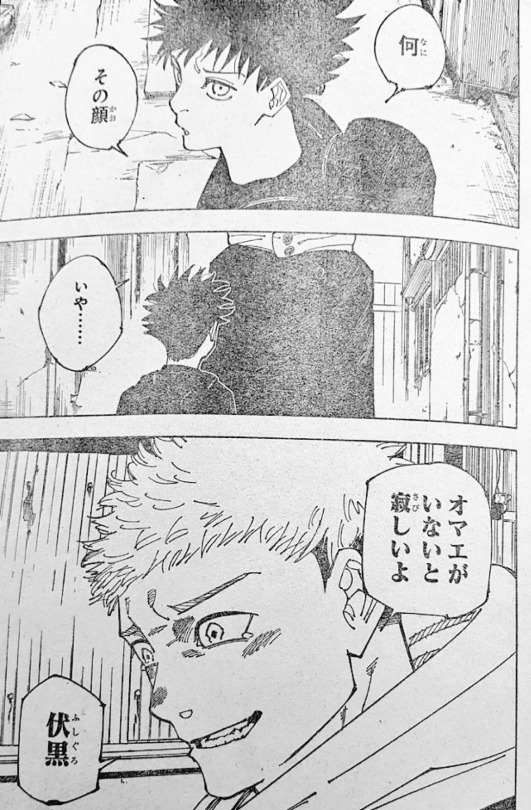
TL;DR: Gojo cares a lot, actually. If Gojo talking about his innermost feelings can't make you empathise, and the students he supposedly "doesn't care about" recognising his burdens can't make you empathise?
Well, that says far more about you than it does about him.
Come read my fics about this!
In His Shadow explores the ways Gojo keeps his distance from Megumi, who isn't equipped with the tools he needs to reach him but finds his own ways to show he cares, born from ten years of history together.
Rivers Crossed, Mountains Scaled explores Gojo and Megumi's relationship through the vehicle of SatoSugu — why Gojo took him in, whether Gojo really gave him a choice, how Gojo sees him.
Hope you enjoyed the post! I love you, Gege Akutami ♥️
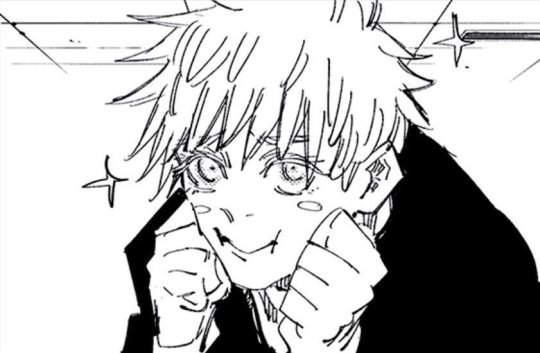
#jujutsu kaisen#jjk#jjk 266#呪術廻戦#gojo satoru#fushiguro megumi#jjk spoilers#jjk manga spoilers#jujutsu kaisen spoilers#jjk meta#jjk analysis#jujutsu kaisen meta#jujutsu kaisen analysis#glo's writing#glo's analysis#fushiglow
551 notes
·
View notes
Text
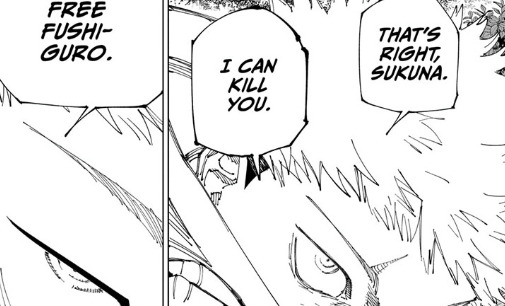
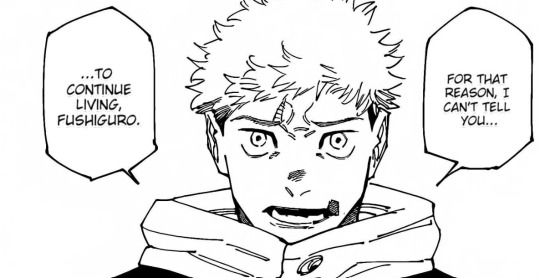
PITY VS. EMPATHY
Jujutsu Kaisen Chapter 265 quickly surpassed Gojo's death chapter as my favorite chapter in the entire manga. It's a high point in both Yuji's character development and the Sukuna fight, a notion most of the fandom agrees with. That being said, it's once again time for me to take a stance contrary to most of the fandom opinion. I was going to make this post two weeks ago but I'm glad I waited, because this week's chapter helps me illustrate my point in the contrasting way Yuji treats Sukuna and Megumi.
As you can probably tell by the title, my hot take of the week is that what Yuji is showing Sukuna isn't true empathy. It's not atn attempt to understand Sukuna's worldview, but rather condescending pity from a place looking down on Sukuna, which is why it infuriates him so much. This is illustrated in Yuji's atual actions this chapter, which is to go at great length to show memories from his past to make Sukuna understand HIM and not the other way around.
Whereas, what Yuji shows Megumi is compassion, because he's not telling Megumi what to feel or imposing his own views on him but rather accepting the fact that Megumi might be suffering too much to keep living on.
I'll explain more under the cut:
Guanyin, Goddess of Mercy
Yuji is, not as far along in his character development as he might seem. I don't want to undervalue his growth, this chapter shows definite progress, and I understand why it would seem that this is the completion of his arc of being a cog in society because he straight up says people don't need roles, and it seems like the manga is quickly coming to a close.
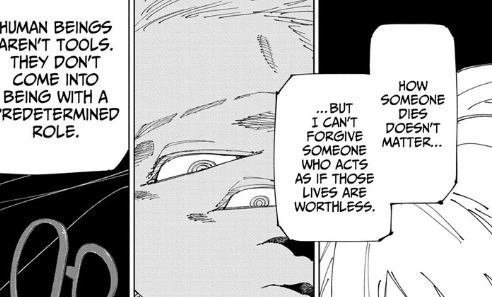
However, sometimes characters words don't exactly match their actions. Sometimes characters aren't self aware. People often call characters multi-layered and complex, but what does that mean exactly? For me, a mutli-layered character is the embodiment of "people are never what they appear to be."
A story has multiple layers when you're not supposed to take everything the author says at face value. Every time you read a story, whether you are aware of it or not you engage in some level of personal interpretation. You're not supposed to automatically accept everything the author feeds you without question. Therefore characters are not exactly what they are stated to be, and good character writing allows room for interpretation for what is going on in a character's head beneath the surface.
In a jungian sense this would be the ice berg model of consciousness. There's the persona, or the ego, which is what the person presents to the world and the people around them. Their own-self conceived image. Then there's the part of the ice berg that submerged, which accounts for all of their internal mechanisms and facets of their personality they aren't aware of. This could range from anything to like, how trauma can affect people's actions without them realizing it, things they are in denial of and don't want to admit to themselves or just like someone who's bossy but not self-aware about that trait until someone else points it out for them.
Everyone's have that friend who you try to call them out on their bad behavior, but no matter how hard you try they just won't admit it. That alone illustrates there's a difference between self-perception, how we view ourselves, behavior - how we actually interact with the world, and pther people's perception of us. Somewhere in between these multiple points of view there exists a vague outline of a person, and personality, whatever "personality" means exactly.
To step away from Jung, in a character writing sense this means a good character's motivations, personality, and actions can be viewed from multiple angles. There is conflict between how Yuji views himself, his actual actions in the story, how other characters might view him, and how he's framed in the story. The first two, Yuji's self-assigned roles, and what his actual actions amount to is a conflict that's run over the entire story.
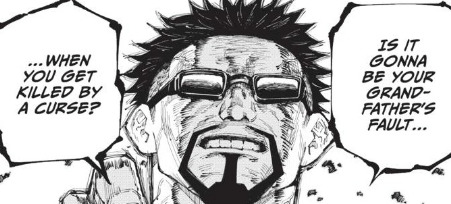
It starts from chapter three, where Yuji's answer for why he wants to become a sorcerer is that he wants to fulfill his grandfather's dying wish, and Yaga immediately says "Is that what you really believe, or are you just using your grandfather as an excuse?" The story shows us Yaga was right to point out the discord between Yuji's stated motivation and his actual desires because Yuji changes his answer.
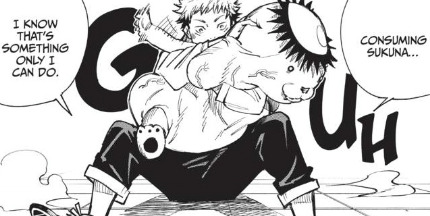
This stated motivation, "To do something that only I can do", or have a role as another way of putting it is Yuji's central motivation for most of the manga. Of course as I said people have multiple layers, so he can also have multiple motivations. Yuji's desire to have a good death, him wanting to be surrounded by people when he dies, his belief that fulfilling his role as a sorcerer will save other people from curses, all of these things are equally true but that one desire to have a role to play in the grand scheme of things is at the center of it.
The role Yuji has chosen is to kill curses so people can have more natural deaths, and also to stop more victims of curses from piling up. He's also resolved from the start to die with Sukuna in his body, to also spare victims of curses Sukuna might attract, and also kill Sukuna for good.
Even these stated motions are challenged right away, and then again continually through the comic.
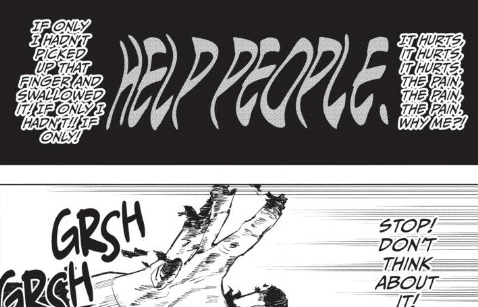
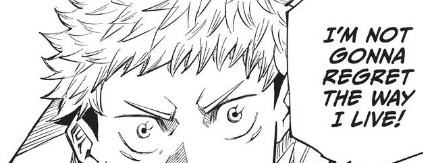
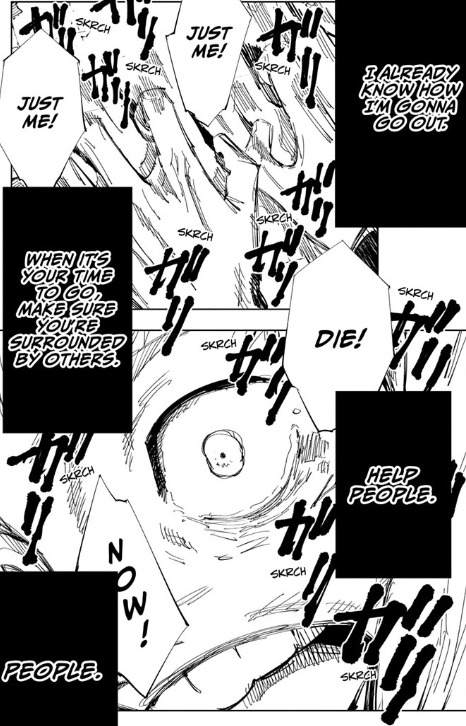
I'm not going to go over Yuji's entire arc here, but the fact that Yuji is someone constantly interrogated for his motivations and even punished in story for his altruism is a constant pattern in his character arc.
It extends deeper than just the fact that Yuji is a selfless person in a world where selfish people like Mei Mei, and Sukuna get ahead while people like Nanami die young. A world where it is in your best interest to stick out your neck for others.
For me a lot of the harsh consequences Yuji's conflict in the story also centers around the fact that he can never live up to the role that he has assigned himself. Not only is Yuji mistaken in his perception of himself, but the fandom in general is as well, because most people tend to take Yuji's stated desire to guide people to good deaths and save them at face value.
For example, people were excited to point out the Guanyin symbolism directly referenced this chapter, and also the significance of the seal for Yuji's domain.

There is much speculation, but it seems certain that this hand sign is an invocation of Ksitigarbha, a revered bodhisattva in East Asian Buddhism. Ksitigarbha is also known as Jizo Bodhisattva in Japan. His name can be translated as Earth Womb, Earth Matrix, and Earth Store. These translations evoke the image of a vessel, which seems relevant to Yuji's role as Sukuna's vessel.
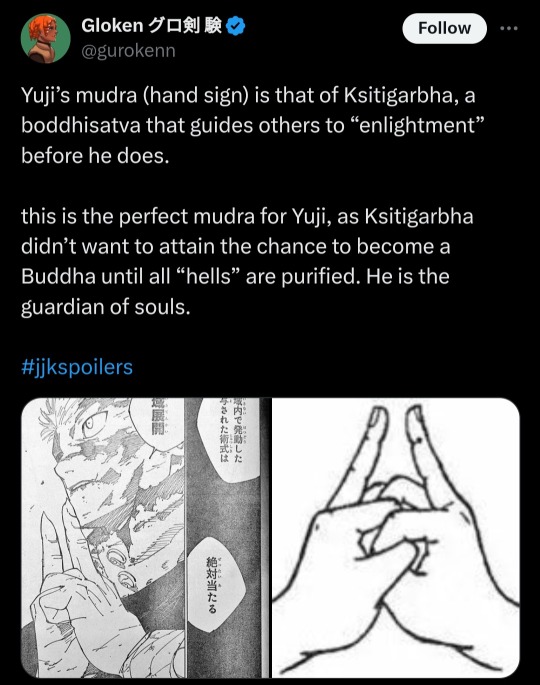
While I agree the symbolism is well suited for Yuji's goals, someone who wished to guide people to a more peaceful death, and also the way Yuji opposes Sukuna right now determined to kill him who lingers in this world as a parasite for a thousand years finally back to the cycle of reincarnation. It even alligns with his desire to try and make Sukuna understand the value in one individual's life by showing him his memories. In that way Yuji is fitting the role of someone guiding others to enlightenment.
However, Yuji is not a bodhivista in the end. He is a normal teenage boy. In fact this is the crux of Yuji's character to me, he is a good kid, but he's not as good as he thinks he is. If anything this is what this chapter goes to great length to demonstrate, that Yuji despite being a science experiment to create the perfect vessel for Sukuna for Kenjaku's 1,000 year plan, had a normal childhood. All of the things Yuji says in this chapter are for the most parts the musing of a normal kid his age.
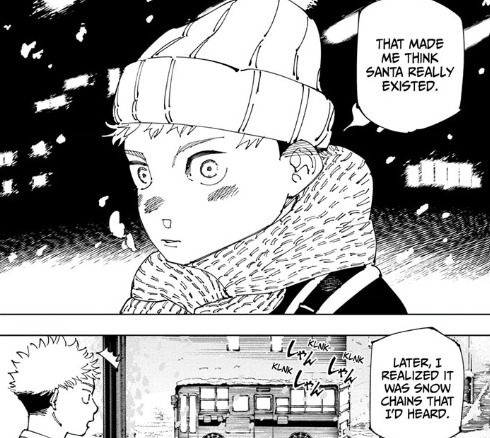
This isn't me criticizing Yuji. I'm just trying to state the message I believe Gege is getting across in this chapter. It's similiar to the conclusion Yuji himself comes to, the conclusion that the value in life lies in the memories you make on a day to day basis, even if you're not living a life full of adventure.
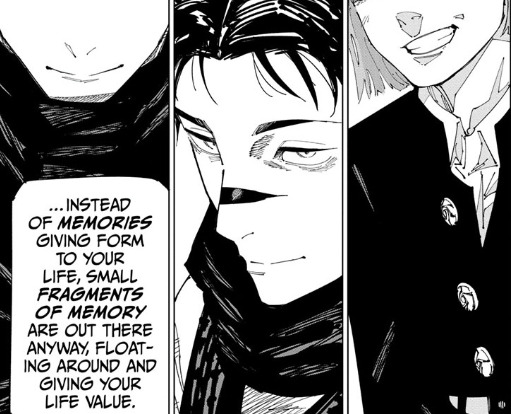
Yuji's conflict is that he pursues the role of a bodhisvatta, and he holds himself to the standard too of someone who exists to be a sorcerer because by doing his job as a sorcerer people will get saved as a result. However, Yuji as a person will always fall short of this ideal, because ideals by the nature of them being IDEAL and therefore not compatible with reality.
To use an example for another media, it doesn't matter how hard Shirou Emiya strives to save others, or how selfless he tries to be, he will always fall short because the ideal of saving absolutely everyone is impossible. However, in most versions of Fate's story Shirou absolutely refuses to compromise on this and in the future, Shirou will continue to strive towards the ideal of saving everyone until his inability to achieve that ideal and the number of people he's failed to save eventually breaks him.
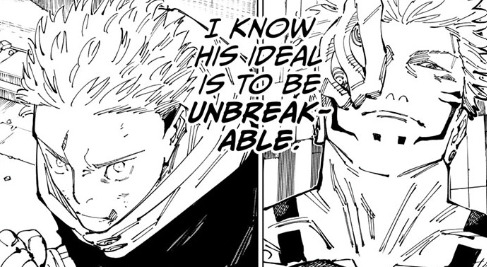
So Yuji may genuinely hold onto an unbreakable ideal, but is his inability to let go of that ideal necessarily a good thing? His ideal might break but what about Yuji as a person? Yuji will in the end always fall short of that ideal because of his humanity, especially since Yuji is the most human character in the story and practically the only one with a normal background.
There's also as I stated above Yuji might not be aware himself of the ways he falls short of his ideal, because he has a flawed self perception. Yuji is getting closer with his revelation in this chapter of looking at reality instead of trying to have a role like a character in the story, but that doesn't mean he's finished (since the story's not finished) or he's become a fully realized character.
One of my favorite quotes from my favorite Yuji video helps describe the point I'm getting at with Yuji's lack of self awareness and the way he sometimes falls short of the savior he sees himself as.
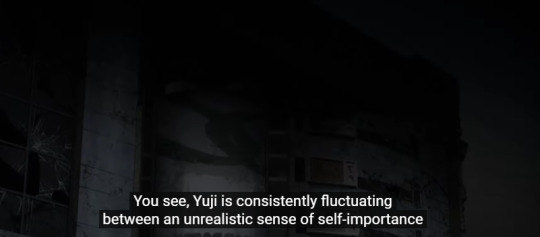
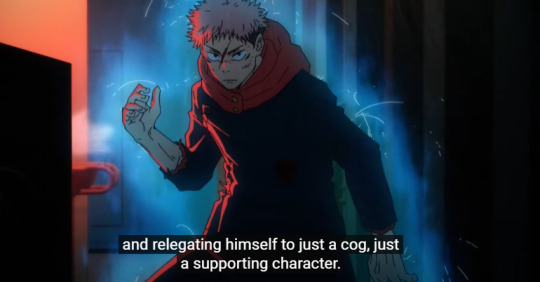
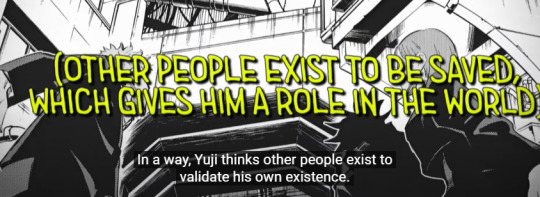
By assigning himself the role as heroes, and the other characters as victims to be saved Yuji sort of condescends to the people he endeavors to save. I describe this as condescending because this way he doesn't see the people he saves as fully fleshed out human beings who are separate individuals from himself.
Yuji is alligned with Higuruma of all people, someone who shares Yuji's savior complex and becomes disillusioned because the people he decided of his own free will to protect as a defense attorney are not perfect victims.
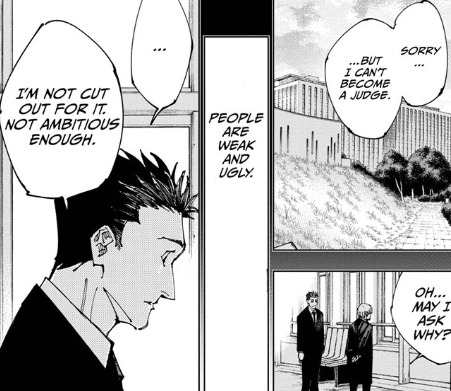
Someone who becomes disillusioned when looking at flaws in other people, and also cannot deal with his own guilt when he too, becomes like the crimminals he once defended after becoming a murderer.
In fact Yuji sees himself in Higuruma's inability to live with his guilt, and only being able to see himself atoning with his death. Yet, despite Yuji seeing himself Yuji also seems uneasy with Higuruma being unable to see one other way forward in life.
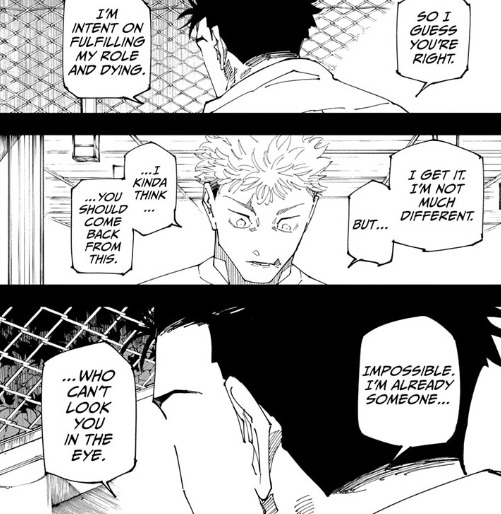
Also, remember that Higuruma is a defense attorney. The whole point is he's supposed to defend crimminals even if he knows they did the crime and try to get them off their sentence and win the trial. Therefore at this moment Higuruma has failed to live up to his ideal.
There's another character Yuji is paralleled to constantly, who also shares Yuji's symbolism of being associated with a divine, and benevolent figure.
Geto's ears, his dressing as a monk in a Gojo-gesa, this official art all connect Geto to be Budha and yet it's quite obvious that Geto has failed entirely to live up to his role as the budha.
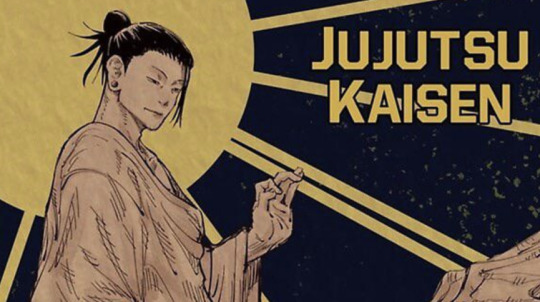
There's so much symbolism aligning Geto as a divine figure bringing salvation to others, and this corresponds to his original ideal as a sorcerer who belived that sorcerers had an obligation to use their powers to protect others, because in a just society the strong protect the weak.
Geto is an outsider who wasn't born into the Jujutsu World who entered in with an attitude different from most sorcerers by trying to become a sorcerer for altruistic reasons. However, Geto, like Higuruma grows disillusioned when he's confronted with the fact that the people he wants to save are flawed.
However, Geto's ideal was mistaken to begin with because much like Yuji, by distinctly separating people into the weak and the strong, he's separating them into two categories where the former is inherently inferior to the latter. Other people existed to be saved by Geto. He couldn't cope with the fact that the people he wanted to save were people and not victims.
So we finally circle back to chapter 265 where Yuji is attempting to relate to Sukuna and see some humanity in him... or is he?
Yuji shares the same flaw of both Geto, and Higuruma where he sees the people he wants to save as existing in a separate category than himself. So, is what Yuji is offering Sukuna understanding and an attempt to emotionally reach out to him, or is he attempting to show Sukuna the mercy of a conqueror.
Even if Yuji wins the battle and spares Sukuna's life in the end, it won't be Yuji's compassion or empathy that won him the fight. If Yuji wins against Sukuna it's simply because he's stronger. Yuji only feels confident trying to offer Sukuna in the first place because this time he's finally confident he's stronger. It's mercy, offered at a threat with the same time. Yuji, like Geto, is still separating people in categories of strong and weak, he's just showing mercy to someone he now considers weaker than him which is why Sukuna reacted the way he did.
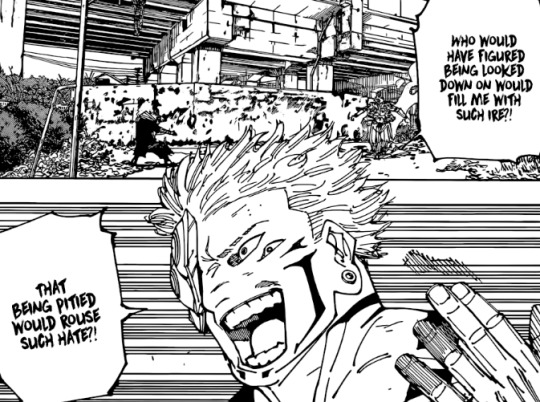
As I said above, Sukuna begins by just assuming that Yuji had just let go of his anger, and was now trying to reach out to him on some other way. He calls him weak for being unable to keep hating his worst enemy, because in Sukuna's world view Yuji should keep hating him and wanting to defeat him with all his strength to the end. Sukuna mistakenly believes for a moment that Yuji is the kind of person who, cannot sustain his anger even towards his worst enemy.
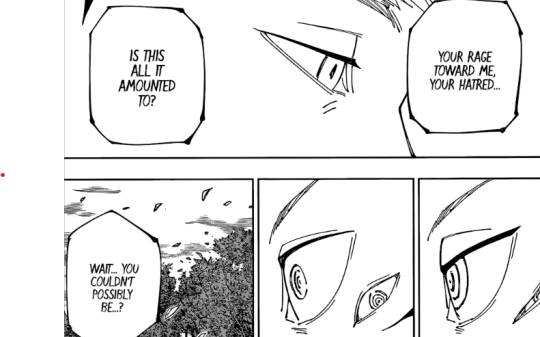
It's when he realizes that Yuji is just showing him simple pity that he snaps. Yuji doesn't care for understanding Sukuna's worldview or seeing the humanity in him, in the same chapter he says he can't forgive people who act like lives are worthless.
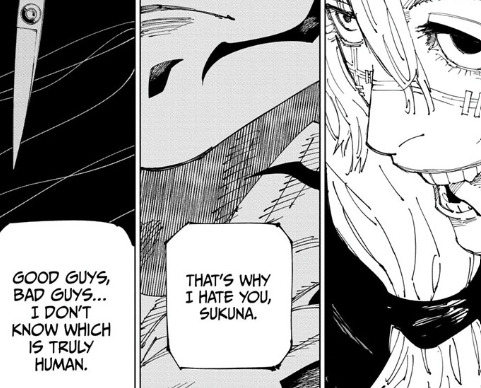
To Yuji's credit he admits he doesn't really know which side of the fight is truly human, or whether or not he's right, he admits it's his own personal belief. A lot of Yuji's wisdom this chapter, I'd argue, comes from admitting the things he does not know, and acknowledging that there's no objective truth or "meaning" to the world. However, he still separates people into "good guys, and bad guys".
Yuji isn't actually that interested in considering the perspective of those he considers the "bad guys" he just still had a faint hope that he could somehow convince Sukuna to see worth in his life by sharing memories, therefore convince Sukuna that an individual's life can have value.
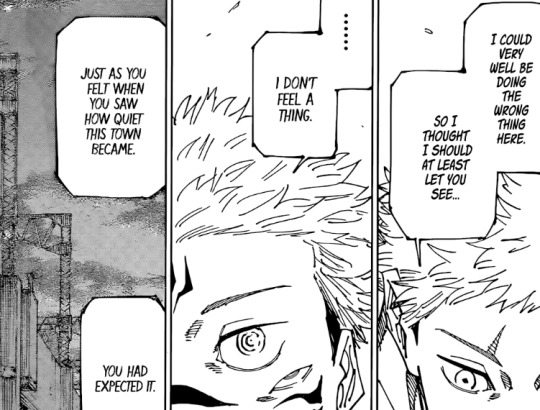
He doesn't want to understand what Sukuna thinks, he wanted to change the way Sukuna thought so it was more like himself. Yuji doesn't ask Sukuna any real questions about himself while exploring his memories. Kind of ironic, because for some reason Sukuna of all people was patiently listening and even engaging Yuji in conversation while he went through the most mundane memories of his childhood.
Irony on top of irony, Yuji's worldview does resemble Sukuna's in some ways. They're supposed to mirror each other after all, Yuji is literally the son of his identical twin brother reincarnated. First and foremost Yuji's offer of mercy isn't really breaking away from Sukuna's ultimate ideal of "Might Makes Right." Yuji isn't seeking some other way of settling this besides fighting Sukuna, he's going to make Sukuna submit because he's stronger.
Maybe there was no hypothetical "third way" for Yuji to put down Sukuna other than fist fighting him into submission. There probably wasn't, Sukuna's pretty up front what he's about, and what he's about is being the strongest and nothing more. He lives and dies by violence, a Sukuna who isn't the strongest is nothing more than a corpse so can that person be reached? However, I just wanted to point out that Yuji wasn't interest in solving this in any way other than a fist fight to begin with. As opposed to say, the way that Takaba handled Kenjaku taking a third route by making Kenjaku feel entertained for the first time in 1,000 years.
In the middle of that fight Takaba even APOLOGIZES to Kenjaku, for saying that it doens't matter if he doesn't understand his audience and he fails to make 1% of them laugh as long as the other 99% of them are laughing and states it's his duty to make everyone laugh otherwise he's failed as a comedian.
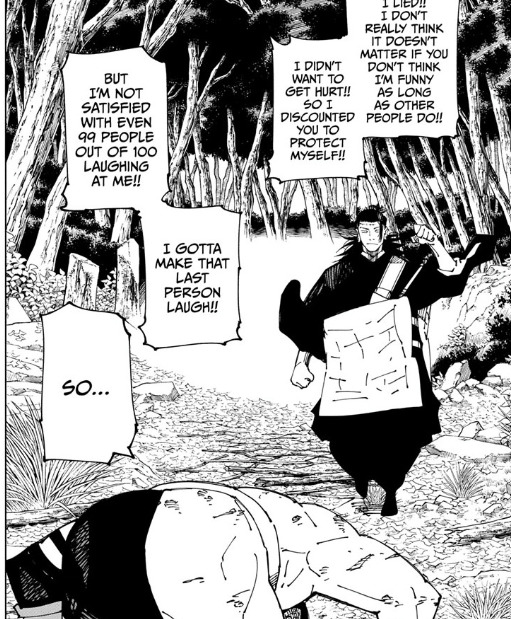
Yet, another reason why this is the greatest fight in the manga. Yuta even remarks in the end that Takaba isn't someone who can kill people. Not only does his cursed technique negate most damage to him by turning it into cartoonish antics, but Takaba's comedy is also all about understanding his audience and trying to get his audience to understand him because his comedy began when he clowned around as a kid when he was lonely. All of this to say we've been shown more points of view than just "Might makes Right" and there are characters who've resolved conflicts in other ways. Kenjaku is also, probably as monstrous as Sukuna, and yet Takaba engaged him right from the start by asking him about his motivations and if there was some other way he'd be happy than the merger.
You could argue that maybe Sukuna can't be understood. Characters in the story certainly try to and all they amount to doing is projecting their own ideas onto Sukuna. Yorozu projects her obsession with love onto Sukuna and we get the idea that Sukuna must somehow be lonely at the top, but in the end Gege subverts this expectation by showing us that Sukuna was never lonely, rather characters like Kashimo and Gojo projected their feelings of unresolved loneliness onto him. They are strong, and he is strong, ergo he must feel the same crushing loneliness as them. Gojo himself demosntrates not understanding Sukuna as he expresses regret in the afterlife that he was unable to make Sukuna go all out and that he related to that guy's loneliness only for Sukuna's response to be a very gratified "You cleared my skies."
Sukuna: Others love us for our strength, and we respond to that love.
The twist of that is Kashimo and by extension the audience assume that Sukuna must not understand love, and therefore he's lonely. However, Sukuna all along had his own definition of love, that people express their love and admiration for him by trying to fight him and he receives their love by facing them at his full strength and giving them the chance to prove themselves. Sukuna's habit of toying with his opponents is an extension of this he wants to see them realize their full potential in their fights with him. Sukuna does understand love, he just REJECTS our understanding of love. Sukuna does not think in the way that we do, but that doesn't mean he doesn't have things he values, or is devoid of positive traits. Respect for his opponents, honoring strength, these are all values they're just not Yuji's values.
As stated above, the irony of all this is that Yuji does buy into "Might makes Right" to an extent. To reiterate, following Geto's "the strong exist to protect the weak" still divides people into two categories strong and weak and implies the weak are helpless. A benevolent might makes right, as you might say. Yuji wants to show compassion to the weak, but he also loathes weakness, he loathes himself for being weak.
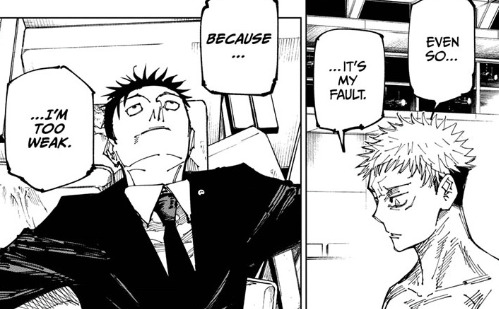
"There still may be lots of people who are weak like you."
Higuruma even points out the flaw in his mindset, well if you loathe yourself for being weak, then what about other people who are weak do you loathe them too? I think it's no coincidence that Yuji is paralleled not one, but two (Geto, Higuruma) people who tried to use their strength in benevolent ways only to start out loathing the people they were trying to help. I'm not saying that Yuji secretly hates weak people, but his mindset of black and white, weak and strong, a mindset that can't accept the greys of reality is a dangerous mindset to have and Yuji has the potential to become like those two.
However, these parallels exist for us the audience to see just how close Yuji was to repeating the cycle, because it makes it that much more meaningful when Yuji grows in ways that Geto and Higuruma doesn't to move one step forward towards breaking that cycle instead.
Yuji is someone who experiences the same loneliness as Sukuna and Gojo for being the strongest, though to a lesser extent because he wasn't born into the realm of sorcerers. At the start of the manga we're introduced to Yuji a kid who despite being someone friendly to everyone he meets and incredibly social, has a friend group consisting of two friends. Two friends who hang out with him because they need a third member for their occult club. Yuji for the whole manga excluding one exception really only knows how to form relationships based on someone else needing him.
Noritoshi Kamo: Itadori why did you become a Jujutsu Sorcerer? Itadori Yuji: It just sort of happened. i'm a loner. I wanna help a lot of people so when I die I'll be surrounded by people.
Yuji has also appeared in flashbacks in early culling game as someone who doesn't really understand, or even take notice of weak people. Yuji in Amai Rin's flashback is beating up bullies, a heroic notion, but from the perspective of somone spineless like Amai who was just going along with the bullies so he himself wouldn't be bullied because he didn't have the strength to stand up with them, and wasn't born with the body of an MMA fighter at fifteen, Yuji looks scary.
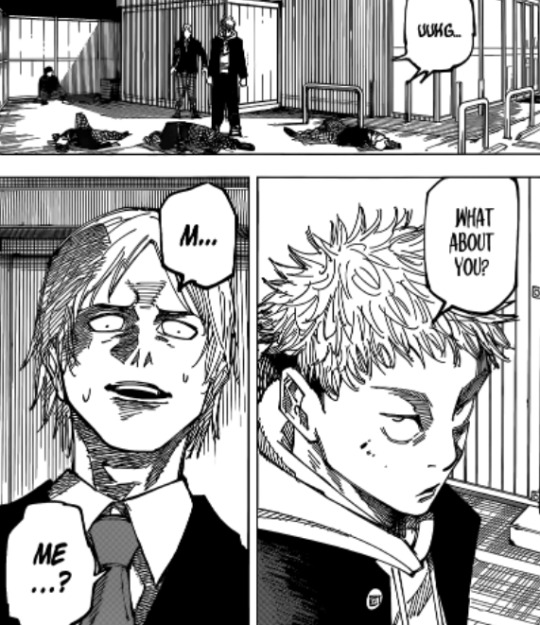
The reason why reducing people to labels like strong and weak is reductive is that humans are complex and contradictory creatures. Let's take Amai Rin for example, an incredibly minor character. In the real world, Amai Rin would be someone as equally complex as Gojo Satoru. Amai Rin a middle school bully would have just as many layers to his personality, inconsistencies, contradictory behavior, different sides of himself as Gojo Satoru himself.
Humans are complex in the first place because we can't see inside their heads, we can only see inside our own heads and know that we're complex and sometimes say things we don't mean, behave differently depending on the situation, do things we're not proud of, but we also usually don't perceive others the same way because we are not inside their heads like our own. Amai Rin is just as complex and multifaceted a human being as Gojo Satoru, he is a person with his own memories and life experiences that shape him, but from Gojo's worldview Amai Rin is a minor character. By reducing him into someone weak, Gojo doesn't care to try understanding him.
So Yuji for the longest time does not try to see the humanity in weak people (except for his big moment with Junpei) he just sees them as people to be saved. Which is why his real moment of progress to me comes the next chapter, with the way he shows empathy to Megumi.
Yuji begins when speaking to Megumi by relating his frustration with his grandfather for not wanting to go through chemo and accepting his own death in old age. Yuji is now mature enough to understand that just because his young body is tough enough to endure chemo, doesn't mean an old man's body can withstand that pain. When he was young Yuji had a very immature viewset of "Well, I can endure it, so why can't they?"
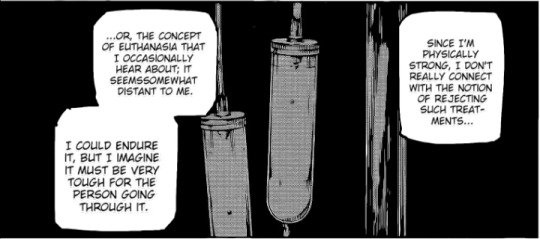
Yuji then compares the situation with his grandfather to Megumi. Yuji wanted his grandfather to keep living, so he couldn't understand why he wouldn't even try the chemo. Yuji wants Megumi to keep living, but he now understand why Megumi wants to give up. Yuji' fe elings of wanting Megumi to live are not more important than Megumi's own feelings of despair and wanting to escape pain.
Yuji is no longer imposing his feelings onto Megumi. Yuji is respecting Megumi's feelings, because in the end he can't FORCE Megumi to live. It has to be Megumi's choice whether he wants to live or not.
Yuji is no longer pushing Megumi away, or acting protective of him, while disregarding his feelings. He has gone from "as long as I'm around you'll suffer" to "I'll be lonely without you." Yuji doesn't ASK Megumi to live even though he wants to, because he knows he can't tell Megumi to keep on living. What Yuji does is just an honest expression of his own feelings. He's sharing his own feelings after listening to Megumi's ideal life with Tsumiki and Yuji, because that's what empathy is, an exchange, a conversation.
People often jokingly use the term "yap sessh" on Twitter, but yeah that's the different between a conversation and a "yap sessh" in the former you actually care what the other person has to say, in a latter it's only about expressing your own opinion.
That's why this panel, is such a perfect contrast with this panel.
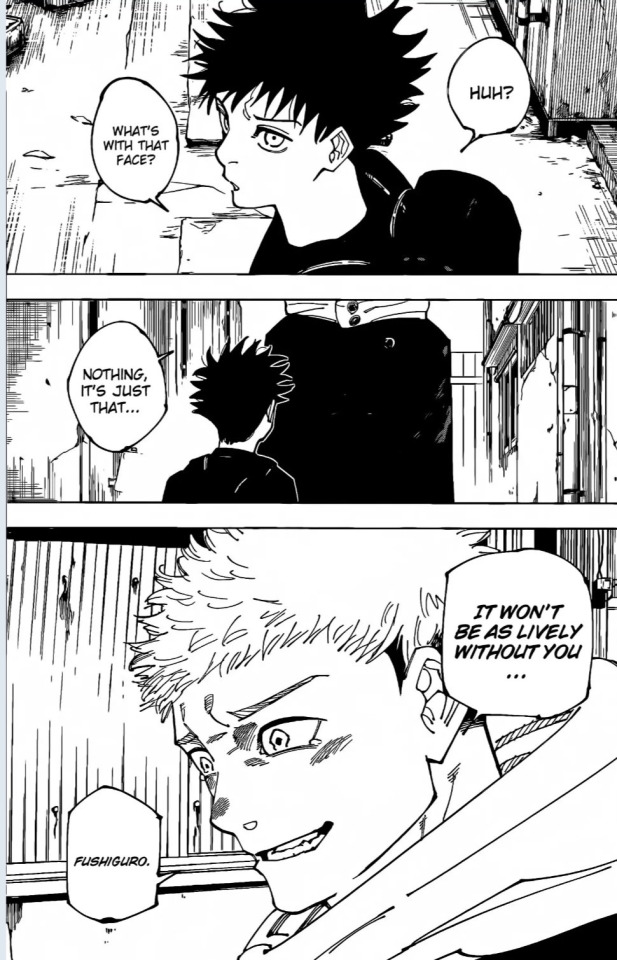
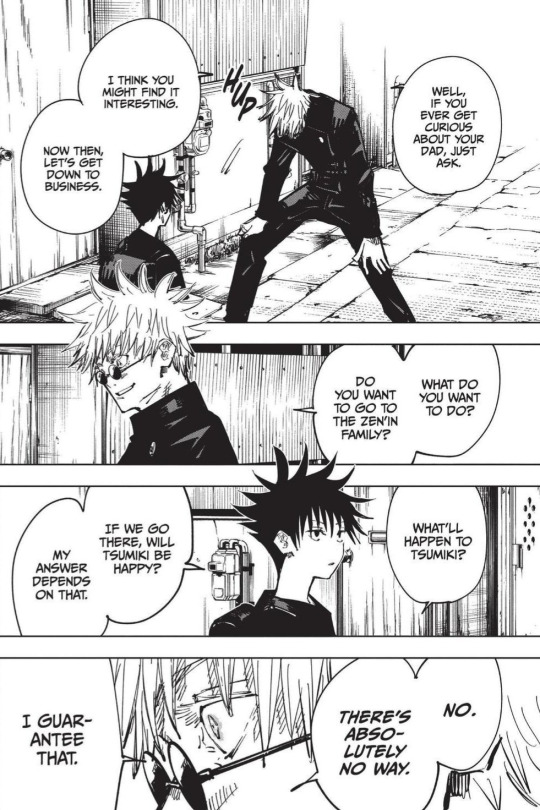
One is Yuji offering Megumi a choice. The other is Gojo taking Megumi's choices away by giving him the false choice of "go to the Zen'in Clan and be a sorcerer and your sister will be abused, or come with me and be a sorcerer." Gojo railroaded Megumi into being a sorcerer and never let him decide for himself if he wanted a normal life. Gojo didn't see Megumi as his own person either, he, just like the Zen'in Clan just saw Megumi as the holder of the Ten Shadows Technique.
This is entirely different to Yuji who respects Megumi's feelings. Yuji expresses that he'll be lonely without Megumi, but that's just laying the cards on the table. In the end Yuji leaves what happens next entirely in Megumi's hands. Yuji cannot tell Megumi to live, even though he wants him to live so badly, he cannot tell Megumi to just get stronger and keep on trucking because he's not Megumi, he's not experiencing Megumi's pain right now.
Yuji does not tell Megumi to live and therefore becomes the first person in Megumi's entire life to give him a choice. This choice is the most important choice of all, a choice we make every day of our lives. The choice of whether we want to keep on living in this world.
Hopefully, Megumi chooses yes.
#jjk meta#megumi fushiguro#yuji itadori#sukuna#ryomen sukuna#geto suguru#higuruma hiromi#itafushi#jjk spoilers#jjk 266#jujutsu kaisen spoilers#jujutsu kaisen 266
558 notes
·
View notes
Text
the gojo getou storyline makes me unhinged for so many reasons. it's told totally out of order. you meet getou's corpse first, then watch gojo kill him in the film after getou's gone insane, and then you see their friendship. that friendship that's just two teenagers and all it's fun chaos and conflicting ideals. then. toji happens. and both of them during this period were SO CLOSE to being the only ones who understood each other. so close to being able to see through one another-- "you haven't released your technique yet, have you? you've not slept either, and I bet you're not gonna sleep tonight either-" and "suguru... have you lose weight?" and yet their friendship, the trust between them, "after all, we're the strongest", was splitting at the seams the more what they could individually tolerate changed. gojo had awakening by himself, accepted himself as THE strongest, felt a little untouchable and so able to change things, was choosing teaching and facing the elders-- and getou's conflicting ideals and sacrifices in all his comparative powerlessness as missions by himself piled up sent him spiraling. the dam breaks and getou takes his own route and so becomes a wound gojo would hold onto for the rest of his life. a pain that would be weaponised against him. it's feels like such a flip from adult gojo being seemingly too cool, uncaring and childish, when in fact it's getou who treats their past friendship as some trivial teenage stuff, while gojo holds onto everything with deep regret, and later with deep betrayal at seeing getou's corpse used this way.
#tHE WAY THEY BOTH CHOSE TEENAGE FATHERHOOD AS THE ANSWER AFTER BREAKING UP WAS WILD TO ME TOO#like ??? whack stuff#jujutsu kaisen#jjk spoilers#gojo satoru#getou suguru#stsg#satosugu#txt#my thoughts#jjk meta
3K notes
·
View notes
Text
Sukuna’s Loneliness Part 5 (Sukuna Did Nothing Wrong in the Heian Era, Probably)
Part 1 Part 2 Part 3 Part 4
Some notes before we start.
1) Big content warning for in depth discussion of historical slavery and the exploitation of minority groups.
2) I will be mainly using the TCB scans for the manga because of their accessibility.
3) Raws are from Mangareader(.)to.
(Click images for captions/citations.)
Preface
This is another case of me making everyone suffer the consequences of my fic research. I finally got my hands on 100+ page THESIS on the lives of the lower class in ancient Japan that references multiple peer-reviewed sources. This is my holy grail. Please read all of it. (Thank you Mr. Breann M Goosmann!) Whenever I quote something, I am quoting this source. Most of what I'm summarizing is directly from this source.
Gege may have failed to write a proper backstory for Sukuna, but one was clearly set up using the actual history of that time. So I'm here to infer what's in those gaps using this document.
The Class System in Ancient Japan
During the Heian Era (794–1185) a social caste system called Ritsuryō (you can read more about its application here). The upper class was called 良民 or Ryōmin (good people) and the lower class was called 賤民 Senmin (low people).
The kanji 民 (Min) used for both of these classes can be translated as citizen instead of person. The Wiki page I linked uses the citizen translation. I have decided to change that to people because of 3rd group of people excluded from this system: The 非人 or Hinin (non-people).
Ryōmin included court nobility, citizens, professions that served the court, and tradesmen.
Senmin included servants and slaves.
Hinin included criminals, the deformed/disabled, and those working professions considered "unclean."
The most notable thing about this class system is the mobility between Ryōmin and Senmin. Committing crimes, selling oneself into slavery, aging, paying off debts, and doing good work allowed people to rise or fall from the ranks accordingly. Hinin, however, were confined to their class for the most part because many were viewed as innately "unclean".
Ironically, the best way to understand how this class system functioned is to understand what being "unclean" meant to it.
Uncleanliness (Kegare)
穢れ (Kegare) is a term that can be translated as the following: uncleanliness, defilement, pollution, impure.
晴れ (Hare) is a term considered the opposite for Kegare and can be translated as the following: to clear up, clear skies/sunny, renew, dispel, sacred, pure.
Both of these terms largely inform of how ancient Japan functioned and evolved over time. And though not a black and white dichotomy, it can be generally understood that society was organized in a way to minimize Kegare.
What's interesting about Kegare specifically is its complexity and its impermanence. Rather than being something only bad people have, anyone could acquire and dispel it through the proper rituals.
From the Kojiki, a Shinto document compiled before the introduction of Buddhism, and therefore before the Heian, separates Kegare into 2 categories:
1) Touch Kegare: Defilement through the physical contact with something unclean such as bodily fluids and the dead.
2) Transgression Kegare: Defilement through sinful actions.
"These versions of pollution appear as transient, exorcised relatively simply through misogi (cleansing ritual), seclusion from society, or expulsion of disorder causing elements."
This understanding of Kegare then evolved with the introduction of Buddhism to Japan. (This began in the Nara Era and extended well into the Heian.)
"As Jacqueline Stone explains in her study of deathbed rites and rituals, someone who had become enlightened was considered to have a “pure” mind, while those with a deluded mind were said to have a “defiled” mind. Monastic Buddhists also followed their own codes of “pure” conduct such as refraining from the eating of meat and killing of animals."
The old Shinto understandings of Kegare still carried over with the physical avoidment of unclean things such as dead bodies and blood. However, Buddhism introduced the idea that certain groups of people were innately impure. This includes the Hinin who were uniquely ostracized by this system.
"Hinin, like all outcast groups were bound to their “defiled” status. However, unlike other outcasts, they were also cast as blasphemers of Buddhist doctrine afflicted with karmic illness."
But despite being seen as this innately impure, the religious institutions were closest to them. Of the few places in society willing to tolerate and deal with Kegare, they offered outcasts "positions" where they could beg, display themselves as what happens to people who don't follow religious doctrine, and help with jobs considered "unclean". Since outcasts were considered permanently defiled for the duration of that life, they could touch impure things such as the dead, the sick, and blood on behalf of those avoiding temporary Kegare.
This is exploitation point blank. And though this suggests outcasts had some agency when it came to their survival, it doesn't remove the systemic coercion driving their situation.
Please keep this in mind as I explain why Sukuna did nothing wrong.
Sukuna is Hinin
Though there is plenty of debate on what makes someone Hinin, the general consensus is the following:
"All agree that hinin were considered defiled by others in society and looked at with some contempt. One medieval reference book called the Chiribukuro explains that hinin and other outcast groups “are alike in that they are shunned by human society.”"
But when trying to define Hinin more narrowly, this is the result:
"the term hinin indicated a very specific group of social outcasts isolated from the community and cast aside due to disease or deformation. In his description of hinin, Nagahara explains that those referred to as “kojiki-hinin” were of the lowest social class, physically isolated from their families and communities and therefore excluded from society and economic activities in the medieval period."
Sounds like Sukuna, right?
Sukuna does not refer to himself as Hinin of course, but he does call himself 忌み子 (Imigo).

To quote myself from Part 1, Imigo can be translated as "Abominable Child", "Unwanted Child", or "Shunned Child." None of these translations in my opinion get across how severe Imigo is. It's closer to meaning "child who should've never been born". Like the child's very existence is an affront to god. (If you play Elden Ring the Omen are called Imigo in Japanese for this reason.)
And since we know that Sukuna is canonically a conjoined twin, aka someone with a visible deformity, this all indicates he was considered afflicted with a "karmic illness" that would classify him as Hinin.
This means that from birth, Sukuna was designated as fundamentally unclean and non-human. Within that society, there was no route he could take to remove himself from this uncleanliness and be seen as human.
The following views of Hinin were considered controversial for their time (during the Kamakura Era aka right after the Heian):
"Although Nichiren believed in the karmic nature of certain diseases, he also understood that this kind of disease was not a hindrance to salvation."
"Undoubtedly, Eison envisioned hinin as the physical representation of the Bodhisattva Monju and advocated that compassion and charity were the appropriate response to karmic illness."
And since these controversial views of *checks notes* considering Hinin worthy of compassion and salvation were documented after the Heian, I don't think it's unreasonable to assume Hinin had less advocates during the Heian.
In other words, Sukuna could not exist within human society without being shunned or exploited. The manga itself suggests this has always been the case.

As you can see Sukuna is absolutely miserable performing a ritual someone of this lower class would be responsible for overseeing. All while the people he is helping regard him with disgust. (By the way there is a purification ritual in Nara called Yamayaki that involves burning an entire mountainside. Something Sukuna's flames would be very good at.)
This is also from the same chapter where he's assaulted by Yorozu who assumes he's lonely because he's strong. She's wrong about this. Just like Kashimo who assumes Sukuna cares little for love for the same reasons he does.

Love from one person is worthless when compared to the nonstop ostracization that comes from institutional discrimination. At most, love can offer relief from that pain. It does not eliminate it. I'm saying this as a minority myself. I love my friends dearly and they love me as well, but I still wake up and go about my day with the soul-crushing knowledge that most wish for me to not exist.
Sukuna is not lonely because he's not loved. Uraume clearly does. It's that for circumstances beyond his control, he has been excluded from human society and forced to constantly be around people who exploit him for the very traits they scorn.
Sukuna pretty much confirms this himself when he talks to Mahito.

And you know what? Sukuna deciding to kill all the people exploiting him is completely justified. (Imo, he can even kill the non-sorcerers that discriminate against him as a treat.)
The Cannibalism was Justified too, for the most part.
Another thing to note about Sukuna. He was born starving and he died starving.

Famines and natural disaster were frequent and extremely hard on the commoner population during the Heian. The fact Sukuna was born starving indicates he was of lower birth to begin with since nobility hoarded the resources to avoid starvation for themselves.
One way for commoners dealt with famine was via foraging. We actually see Sukuna doing that when he meets Uraume.

Now there are several very interesting things we learn from this.
1) Sukuna hunts and eats elk/deer. Something massively taboo for the time. Especially since deer were considered sacred animals back then and even to this day.
2) He appears to wander around and owns very little. This is further in line with him being Hinin per the following:
"Clearly, welcome could be revoked at any time, which meant that hinin had to be prepared to leave any location at any given moment. This mobile lifestyle also meant that hinin could only afford to carry essential daily items, such as cooking utensils and begging bowls. The image also reveals that the hinin were never officially invited to stay in that particular area. Instead, they sought out their own locations to set up communities."
3) Despite Uraume being alive and fresh human meat, Sukuna does not immediately see them as food. Nor does he attack them. This, combined with him not taking the dead villagers for eating and preparing deer/elk instead, suggests that cannibalism is not the default for him.
Back to famines, it's also not unheard of for people to resort to cannibalism during them. The logic is simple: An outcast with no support network eats humans to survive.
And given the frequency of death from natural disasters of this time, there’s a real chance he never had to hunt humans in the first place. As Hinin, handling the dead is one of the few jobs he’s allowed to do. So it’s possible the worst thing he did was desecrate corpses in the name of scavenging.
Furthermore, if Sukuna is considered a non-human, is it even cannibalism to begin with? Is a hungry animal evil for eating a human?
I may consider Sukuna human because I refuse to partake in his dehumanization, but it needs to be understood that in the context of the JJK's story, there is not a single character that refers to Sukuna as a human. He's not even referred to as a man. He's either a curse, a monster, or at the very end, a sorcerer. Sukuna has been so dehumanized by others that he himself identifies as a "curse". This is also separate from "cursed spirit", leaving him in his own unique category of non-human.

Sukuna may not see eating other people as acts of cannibalism. After all, they are the ones who decided he was non-human at birth. (And since he is taboo, eating the deer/elk can’t make him more taboo than he already is.)
The following is an excerpt discussing the dehumanization of the starving:
"This strange image is from the Scroll of Hungry Ghosts and the huge emaciated creature depicted is just one of many of the numerous depictions of hungry ghosts or gaki. Invisible to humans, the gaki depicted are the spirits of greedy or jealous individuals karmically punished for their covetous thoughts with perpetual hunger for bodily excretions such as urine or feces."
"The protrusions of the stomach, the red-tinted hair, as well as the greying of the skin, are all genuine symptoms of starvation. In this light, our image appears significantly different. Instead of an invisible monster attacking a man, we have a disfigured and suffering human reaching out for humanity."
The phenomenon of hair during red or blond from starvation is called Kwashiorkor. Gege may be color blind, but Sukuna being depicted with pink or blond hair appears to be deliberate and in line with Kwashiorkor.
Sukuna was probably framed.
The only crimes Sukuna is accused of by Jujutsu Society is murder and cannibalism. As demonstrated by the previous section, there could be a pretty good reason for the cannibalism. But what about the murder?
Another thing that should be noted about Sukuna is how his destruction is largely retaliatory in the modern era. Every kill or kill attempt is made as a response to a challenge that was directed at him first.
When Sukuna first incarnates, Megumi says this to him:
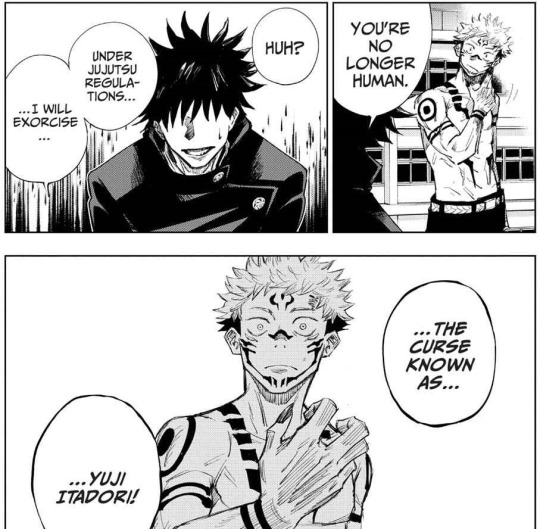
Yuji may be Megumi's target, but remember that Kegare spreads through touch. Sukuna coming into contact with Yuji has made them both unclean. In other words, Sukuna has been informed that in this life, 1,000 years later, where he has yet to do any harm (Those comments about the women, children, and massacre are still sus, but they could've been about the Merger.), he will be attacked by sorcerers no matter what. It's not unreasonable for him to then attack them on sight.
But even when he does that, most of them survive until Shinjuku. During the culling games, Sukuna kills only 2 sorcerers—Ryu and Yorozu. Ryu is given a chance to walk away, but he doesn't. Uro flees and is spared. Yorozu is the sole person Sukuna seeks out to kill and that’s just for his Gojo plans.
And in that month Sukuna has before the showdown with Gojo? Nothing happens. He kills no one and just lounges around. Eating his own corpse is the only cannibalism. He absolutely could have eaten Tsumiki’s body to further crush Megumi’s soul, but he doesn’t.
Then when it comes to the actual showdown, Sukuna kills 3 sorcerers total. It's also very telling that after Sukuna is dead...no one blames him for what happened. They blame Kenjaku, hell even Gojo, but Sukuna isn't mentioned once. Higuruma is convinced that Sukuna was playing around. Kusakabe agrees that Sukuna’s manner of play isn't what they’re super worried about, it's Kenjaku.

The worst thing Sukuna does is Shibuya and that too has nuance to it. The twins aren't killed for fun. Sukuna punishes them for making demands of him. The citizens of Shibuya? Collateral from dealing with Jogo and Mahoraga. (He only really kills Haruta for the sake of it. And let's be real, he deserved that.)
And though the Shibuya civilian deaths are an objectively bad thing Sukuna has done, the fact they are not intentional gives credence to the idea that Sukuna didn't really target them in the past either. This suggests that the "murders" Sukuna did in the Heian were likely retaliation against people challenging him or trying to subjugate him. In other words, self defense.
And if he did wipe out a village, it was probably collateral. But that's kind of the thing. Did Sukuna even kill innocents by accident? The only confirmed kills of the Heian are those of the Subjugation and Military Squads. You know, people who may have attacked him for simply being "unclean".
Who am I kidding he absolutely was attacked for being “unclean”. This is how Angel talks about Sukuna and the incarnated.

She doesn’t care about saving the lives of innocents, all that matters to her are things that she deems evil are purged. Sukuna to Angel is ontologically evil and doesn’t deserve to exist. She targets him more than other incarnated players while ignoring Kenjaku who is responsible for this mess in the first place. She also quite literally did something she deemed wrong and evil so she could follow him into the future and make sure he died. (Move over Gojo Satoru we've got a new minority hunter.)
But it’s not like her attitude is new. Jujutsu Society is notorious for trying to kill things they deem "bad" such as Yuji and Yuta. The striking thing about the wanted executions of these literal children is that the higher ups giving the command make other sorcerers do it for them. Going back to the ideas of Kegare—spilling blood and touching corpses makes one impure so the outcasts are to deal with it. This is the logic driving their decision to coerce Yuta into a binding vow to kill Yuji.

("No matter how many cursed spirits you kill, it's proof of nothing!" <Please take note of how Yuta's good deeds do nothing to earn the higher ups' favor because he's seen as inherently evil.)
Yuta is essentially scapegoated through this manipulation and Yuji initially treats him like an enemy. In the same way characters like Kusakabe blame Gojo for refusing to execute Yuji. Despite the higher ups being responsible for the system functioning this way, the people they’re manipulating bear the brunt of responsibility to other characters.
Who's to say Sukuna isn't also a victim of this scapegoating? His power is comparable to a natural disaster. It would be very easy to blame one on him. After all, the higher ups of the Heian, the Fujiwaras, did exactly that to Uro.

Uro’s situation is much worse than Yuta’s however. She is a military slave. This distinction of military slave is important because unlike domestic slaves, they were allowed to rise through the ranks and be given awards despite their status.
And since Uro is a Sukuna parallel, there is a pretty good chance he was a slave at some point during the Heian.
Slavery in the Heian
A little detail I left out when discussing famine in the Heian. The asymmetrical wealth distribution was so severe during this time that commoners would sell themselves into slavery in hopes of not starving to death.
An example from the Kamakura Era (after the Heian):
"As the article shows, during the three years of the Kangi famine (1229-1232) and several recovery years following, various common people sold themselves, their relatives, and their retainers into slavery in exchange for sustenance. Not only would an amount be given to the seller, but also presumably whoever now owned the sold individual would be responsible for feeding and providing shelter for that individual. In this way, the common populations of Japan created a strategy for survival. There was no certainty that a new owner would fulfill this obligation, but the promise of reprieve from daily struggles was impetus enough for the sale."
Another example from the same era:
"A didactic tale from 1283 tells the story of a small family consisting of a mother and son, who after experiencing severe famine, came to the realization they would soon starve to death. In the hope of saving his mother, the young boy offers to sell himself into bondage, and although the mother disagrees, he goes ahead with the plan."
Yes this is as bad as it sounds, but there is one thing I would like to get out of the way—this slave system did not function anything like the chattel slavery during colonialism. Strangely enough, these slaves had some rights they could fight their owners in court over. They could pay off debts and be set free. They were allowed to be married and have children with those outside of their class. They were not kept in cages or in chains like animals. (Silver linings! /s)
The term used for these slaves was 奴婢 (Nuhi) which roughly translates to “bonded person”. This is more in the contractual sense rather than the physical sense since most were slaves by contract or debt.
This kind of sounds like something binding vows could do, right? Well binding vows share no kanji with Nuhi using 縛り(Shibari) instead. However, Sukuna introduces the concept of binding vows with chains and a handshake.

Sukuna was also born unwanted to a starving mother during a time when starving people sold themselves or their relatives into slavery to survive. This can mean a lot of things for his upbringing and none of them are pleasant.
Here is a summary of what jobs Nuhi did:
"As stated previously, wealthy households frequently obtained slaves and assigned them to various domestic tasks. However, sources further illuminate trafficking of women into the sex trade of Kamakura Japan."
If you noticed, Sukuna's Cursed Technique is perfect for this. He can chop up veggies, butcher fish, till farmland, slash and burn farmland, light fires, and every other non-violent thing a knife and fire can be used for. If he wasn't exploited for exorcising curses, he absolutely would've been exploited for domestic tasks.
And to get to much more depressing line of work Sukuna could've been subjected to as a child, I'd like to discuss why someone as masculine as him would be associated with women's work in the first place.
The Treatment of Women in Ancient Japan
"In Japan prior to the Heian and Kamakura periods, women played prominent roles in religious activities as miko, which was akin to a female medium or female shaman...Since miko functioned as a sacred and integral part in religious communities, issues of impurity did not appear to be an issue. Instead, it was Buddhist ideas that linked the female form to impurity."
With the introduction of Buddhism, women began to be seen as innately impure due to the blood and fluids associated with childbirth and mensuration.
"In the Heian period, Buddhist temples such as such as Enryakuji and Tōdaiji, began barring women from entering the premises due to their defiled nature."
"prominent Buddhist discourse painted women as innately defiled and therefore unable to achieve enlightenment in their own female bodies."
"To be born as an innately defiled female was considered a karmic punishment for past actions."
Though not ostracized as much as outcasts, women were seen as innately unclean in a similar vein to Sukuna. Women were expelled from religious institutions but not the courts, while outcasts were tolerated by religious institutions and barred from the courts. (The courts and temples operated independently of each other, which is why it was possible for noble women to hold power despite being designated as unclean.)
A few months ago I made a joke about this panel:

"Sukuna’s two options were helping Uraume transition or becoming a girl himself."
This is still mostly a joke, but I do think Sukuna identifies more with women than with men. Not that Sukuna is a girl, but that he relates to them and their struggles better. (Keep in mind he does wear a women's yukata and a men's obi at the same time as Yujikuna.)
It's important to note is that this mystery woman here wears the clothes of a Miko or Shrine Maiden/Priestess—the main group of women that was displaced and persecuted because of the new religious doctrine. And like every other group without a proper social safety net, selling themselves into slavery became a survival strategy. They did have other options of course. In the case of Asobi, the Priestess that used to serve the courts, turned to entertainment and sex work after their exclusion.
"Either riding in boats or setting up shop on busy routes to the capital and religious sites, Goodwin argues that these performers were part of independent, possibly female-run organizations, which were not stigmatized until the later part of the Kamakura period. However, as Wakita Haruko has examined, at least some women involved in sexual entertainment were female indentured servants, serving as security on a loan issued by their parents."
In this way, the exact identity of the Miko in Sukuna's path may not matter. She might be a representation of those who accepted their exclusion and did their best to survive on society's terms. If the South choice is meant to represent returning to who Sukuna used to be, then it can also mean the types of struggles Mikos faced are his as well.
However, there was a temple that continued to accept women as followers—the Muroji Temple in Nara. Interestingly enough, this temple contains an inner sanctuary devoted to the founder of Shingon Buddhism, the type of Buddhism Tengen brought over. The mountain this temple is located on is also associated with a dragon spirit. Since there is historical precedent of at least one temple accepting a group of people seen as innately impure, a place like this may have also been a sanctuary for Sukuna.
With the information we have, it's not really possible to know exactly what awful thing happened to Sukuna. The most important takeaway from this is that the suffering he experienced was systemic. He didn't get unlucky with a few ignorant and bad people. This was the direct result of the Heian class system dehumanizing people. In other words, his choices were severely limited.
Sukuna's Other Choice
Going North with Uraume appears to be very similar what he did back in the Heian—taking in an abandoned child and looking after them. What makes this choice slightly different this time around is that the class system that oppressed him no longer exists in the modern era. Yes, he’ll absolutely face discrimination for being deformed, but the complete denial of his humanity at every turn for his appearance is gone. He won’t be treated as untouchable and inherently evil. Legally speaking, he has drastically more rights. Violence won’t be his only option moving up in the world.
I will always loathe that Sukuna had to die to obtain this. And that the “reformed” modern Jujutsu Society refuses to acknowledge the systemic failures of their institution. Kusakabe makes it very clear he still believes the immediate extermination of anything deemed “evil” is a valid way to go about things, even if it means the death of a child…as long as he doesn’t have to do it. (Hence him blaming Gojo for it, just like the higher ups.) After the fight, everyone passes blame around, absolves themselves of any wrongdoing, and decides no one is really at fault.
There were people at fault for this. There are institutions at fault for this. But their failure to confront those things directly is probably why Sukuna rejected Yuji’s offer so viciously. Instead of trying to understand Sukuna on his own terms, Yuji showed him the value of a simple life he was never allowed to have, then told him to die or go back into the cage.

Yuji offered Sukuna pity but no autonomy, which is exactly the way Hinin were treated by the religious institutions of old.
"However, Hosokawa argues that even in veneration of hinin as representations of Manjusri, Buddhist monks continue to discriminate against this outcast group and further perpetuate their low position in society. Hosokawa explains that although activity involved in charitable works towards hinin, Eison cared little about the salvation of hinin because he saw outcasts as divine only within the context of the ritual of assembly. Therefore, all charitable works directed at hinin were merely ceremonial. Hosokawa advocates the view that Eison believed hinin lacked ‘nature,’ meaning they were unable to study or practice Buddhism. Essentially, without nature, they had no ability to escape the cycle of re-birth through the study of Buddhism."
Sukuna even thinks of modern sorcerers like the ones of old. Why would he ever want to return to that?

His goals are simple; eat, play, and pass time until his dies. That’s not really evil now is it? But the people attacking him don’t know that. None of them ever stopped to asked because they assume him existing freely will bring evil.
But what does Sukuna do when he’s given a month-long truce a body he completely controls? He does what every minority group does when they are no longer being actively oppresed—he rests. He doesn’t go around killing or tormenting for fun. With his newfound freedom he secludes himself and lounges.
The fight in Shinjuku is essentially a group of well-meaning people from a corrupt institution beating an outcast that was ostracized by it into submission. Albeit for very good reasons.
Why did this fight change his mind?
If Sukuna is basically reliving past trauma via the Shinjuku fight, why did he decide this group of sorcerers was worth listening to? The simple answer of course is he lost to them. Sukuna believes the strong impose their will and the weak follow suit.

I don’t think that’s quite right. Sukuna used to be weak too. He was a child once. He used to controlled by others stronger than him. By his own logic he should’ve stayed like that, but he trained to get stronger and eventually rebelled.
Since Sukuna is a known liar and hides his feelings under several layers of repression, I’m inclined to believe this statement is also smokescreen. And after reading the Uraume Epilogue I am certain of this. But for now let’s revisit the Shinjuku fight, starting from the battle that made me realize Sukuna is indeed a pathetic sopping wet cat underneath it all—Sukuna vs Gojo.
Sukuna vs Gojo
Something fans picked up on during this fight was how Gojo dogwalked Sukuna when it came to Hand to Hand (H2H) combat. During their fight, Sukuna fails to land a single punch on Gojo’s face. It takes Yuta possessing Gojo’s body and fumbling around in it for Sukuna to finally punch that face. But it’s not just Gojo he sucks at with H2H combat. It’s everyone. Here is a compilation of Sukuna getting hit in the head or face.

This seems to conflict with Sukuna’s ability to learn anything visually. He sees someone do something and he can copy it immediately. This contradiction can be explained by him being Hinin.
Sukuna was considered an untouchable. Educated people were of a higher class and believed unclean things like him were to be avoided at all costs. This means that whatever education Sukuna obtained for himself was always at a distance. Aka watch and copy. And since H2H is mostly taught through body to body contact, Sukuna wasn’t allowed a proper sparing partner outside of the attempts to kill him.
In Part 2, I go over Sukuna’s fraud allegations for his copying of Gojo in particular. This is what lead me to realize that Sukuna spent 6 months plotting to kill a guy he met for 10 seconds. This insane level of pre-planning is also shaped by him being Hinin.
We know for a fact that Sukuna hunts deer/elk and that it’s safe to assume he driven to this because of his Hinin status. If you know anything about hunting, it’s that most of it is playing psychological mind games with creatures that are somehow complete geniuses despite having 2 brain cells. You don’t chase after a deer with a gun, you become obsessed with them. You study every little habit of theirs; when they hunger, what they eat, and where they defecate. Using this information, you set up the bait and wait in hiding for the perfect opportunity to kill them.
This is pretty much what Sukuna does to Gojo. He’s got a hunter’s obsession with him. In Part 4, I explain how this obsession might actually be unhinged courtship, but I don’t lay out why Gojo of all people seemingly means this much to Sukuna. This too can be explained by him being Hinin.
I’ve said it over and over, Gojo and Sukuna are twin flames. They are the strongest, isolated, dehumanized, exploited, self-taught, and really bad at showing affection. Part of this obsession is driven by Sukuna seeing himself in Gojo. He's being ordered around by others weaker than him in the same way Sukuna used to be.

But take note of this “I owe you a debt.” It’s easy to assume he means payback for punching him in the face. However…Gojo did actually do Sukuna a massive favor. He suspended his execution, even if it was primarily to save Yuji.
As I discussed before, Kegare was infectious. You touch something unclean and you become unclean yourself. By laws of Jujutsu Society and by social stigma around Kegare, Sukuna made Yuji equally as impure as himself. And Gojo went screw that, I’m going to look after you. He gave Yuji direct lessons, made sure all his basic needs were met, and treated him like a human. Behind everyone’s backs he hid the final finger, intending to let Yuji live for the duration of his natural life.

To Sukuna, Gojo is someone who would have taken him in and advocated for his humanity under different circumstances. Gojo is someone Sukuna would’ve loved to have as a teacher. And so he copies him. He learns and improves his own sorcery as if Gojo had intentionally taught him.
Through the Shinjuku fight, his experiences within Yuji, and Megumi’s memories, Sukuna gets a taste of what could’ve been. With Megumi in particular, he also gets to see what it’s like to be raised by someone who actually cares. Though not intentional, this is how Gojo teaches Sukuna love. This is why when Sukuna looks at Gojo, he thinks about love.

Sukuna choosing to go with Uraume is him copying Gojo one last time. After seeing that even if you’re isolated, exploited, and miserable, there’s still fulfillment in using your power to make sure someone else doesn’t go through what you did. It may not remove all that pain, but it makes it easier.
And bringing back Kegare’s opposite Hare (晴れ). The kanji used are in the Appare Da (天晴れだ) when Sukuna tells Gojo, “You cleared my skies.” (The Da at the end of this statement means it was pretty heartfelt too.) With this additional context, I think it can be taken to also mean that Gojo made Sukuna feel like he wasn’t impure.

Sukuna vs Yuji
Yuji and Megumi are the ones who ultimately make Sukuna realize that it's worth pursing guardianship regardless of marital status or blood relation. They are the two of Gojo’s students/children that are directly compared to Uraume.

Yuji who is also the same as Sukuna, fills the role of Gojo when he first chooses to look after Megumi. When he prevents Megumi from being sold by his father. Sukuna has seen both versions of this memory.

Since Sukuna is a twin to Wasuke and they are also the same, JJK 265 is Yuji showing Sukuna an entire alternate universe of the normal life he could've lived if he had been seen as human.

And even if he can’t ever be seen as human or live normally, Megumi tells him it’s ok to be improper and cherish someone anyways.

None of these 3 realize how greatly they’ve affected Sukuna. He barely admits to it even in death. But Sukuna had secretly wanted this from the start. The cracks started showing when he first tried to teach Megumi in his special little tsundere shark way.

There's also something to be said about Uraume making it to adulthood in a time where famine was rampant and parents would sell their children into slavery just to eat. Their cursed technique manifested around the age of 6, just like Megumi. The fact they survived means Sukuna was already doing a pretty good job as their guardian.
Other Things this Changes
I'm also looking at Sukuna's fondness towards Jogo in a whole new light. I thought that Jogo wanting nothing of him was the main reason he was favored. But there's more to it that that. It’s that he regards Sukuna’s life as inherently valuable. Jogo believes in a world where Sukuna has the right to exist as he is and how he wants. No one will try to control him or condemn him for something he had no say in.
He also stands out in his devotion to curses of any background. Mahito basically looks like a human, Choso and his brothers are half human, Sukuna is fully human, and Jogo accepts them all no questions asked. He’s willing to fight for people who exist differently than himself.
There's also that added “wanting to be seen as human” element. Jogo’s world is one where Sukuna would finally be seen as human. It’s the same logic that drove Choso to side with the Disaster Curses. He knew how difficult human society would make the lives of his brothers (both of which have 2 faces like conjoined twins), so he chose to fight for a world where that kind of discrimination no longer existed. (Which is why it's really sad he died and no one mourned him properly.)

And yes we can condemn the mass slaughter of humans as the wrong way to go about this. But the core problem is that Jujutsu Society branded them as taboo and in need of extermination or containment. They were driven into a corner and believed violence was the only way out. The only reason Choso was able to change was other sorcerers giving him a chance despite the hurt he caused. Something Sukuna didn't get outside of the offer to be caged.
Am I being too lenient with Sukuna here?
Absolutely. I am extremely biased.
To me at least, the type of "evil" Sukuna is has a lot nuance. It is very significant that someone as strong as him, who could basically do whatever he wanted (theoretically), took one willing servant in a time where slavery was widely practiced. (If you read the linked document, it's kind of up for debate how legal slavery was at the time.) It's also significant that the Heian crimes he was accused of were limited to cannibalism and murder. He's clearly got rules about his evilness and I really like that about him. I wanted to find the logic driving them and I think I've finally struck gold.
This didn't fit anywhere nicely. But consider the following:
"Earthly sins, on the other hand, were those that only affected individuals or forbidden actions, such as rape or cutting living flesh."
Sukuna's CT cuts living flesh. His very CT was considered impure in the Heian. The flames however, are more aligned with purification. It's just a neat little thing that shows Sukuna's duality imo.
He's also really good at archery. And though this is likely because his flame CT is a bow, he probably got good at it to hunt deer/elk on top of temple duties. (Just another way he enjoys corrupting the divine.)
But please remember, the only reason I've done all of this is because of Umineko's...
Without love, it cannot be seen.
#cactus yaps#Read Challenges to Survival: Responses of Outcasts and Commoners in Early Medieval Japan and Umineko now!#Posts that make it obvious I defended Edelgard on Twitter.#I've been running PR for Zelgius and Sephiran Fire Emblem since forever and they do so much worse than Sukuna.#Same type of trauma though. I will always defend minorities going insane from systemic discrimination.#Kind of wild that Sukuna's possession of Megumi can be read as evil adoption now. Thanks Uraume Epilogue.#When Sukuna looks at Gojo he not only thinks of love but raising a child. What did Gege mean by this?#Vaguely Sukugo but it's certainly a footnote compared to the rest of this.#Anyone versed in Japanese history PLEASE fact check me.#ryomen sukuna#jujutsu kaisen#jjk spoilers#jjk meta
232 notes
·
View notes
Text
If Geto and Gojo were so close, why didn't Geto try to convince Gojo to defect with him?
Because Geto knew that Gojo’s support would guarantee his success, but that success would come at the cost of hurting Gojo.
I believe that Geto cared more about protecting Gojo than he cared about building a better world.
..
Let me explain…
First, let’s talk about why it would’ve made sense for Geto to ask Gojo to join him:
(1) Gojo would’ve been Geto’s most important / most powerful ally
By the time of Geto’s defection, Gojo is already the strongest sorcerer in existence. He and Geto are two of only three special grade sorcerers. Having them both on the same side is essentially an automatic win.
(2) Gojo should’ve been (relatively) easy to persuade
Gojo had already told Geto that he didn't like having to save the weak and didn't care about the moral justifications for it…
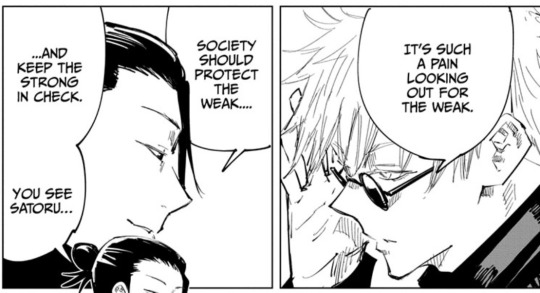
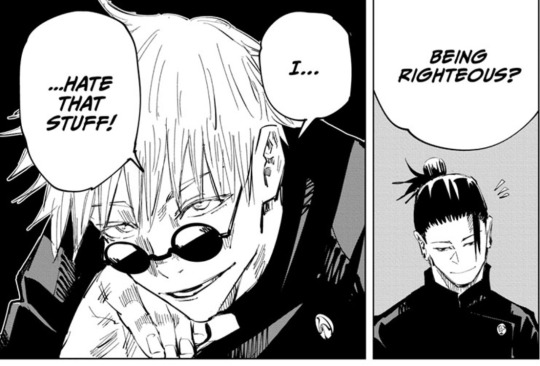
…Geto has also seen that Gojo doesn’t always value / protect human life. He was ready to massacre the Time Vessel Association without reason, but ultimately he didn't, because he deferred to Geto's judgement…
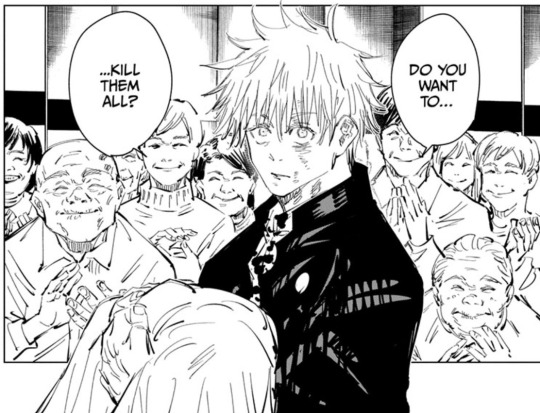
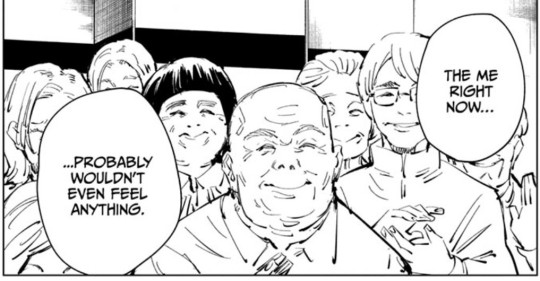
…and, most importantly, they are best friends on a DEEP, unparalleled level. Geto is Gojo’s “one and only” best friend.
If Geto was truly dedicated to changing the world order, Gojo should’ve been the first and most important person that he tried to recruit to his insurgency / cult / mission.
BUT
Not only does Geto make zero effort to reach out to / recruit Gojo, he actively avoids him and pushes him away...
- - - - - Keep reading cut - - - - -
After he kills the 112 non-sorcerers, Geto runs into Shoko in Shinjuku. He happily approaches her and willingly answers her questions.
Look at his smiling face in their interactions:
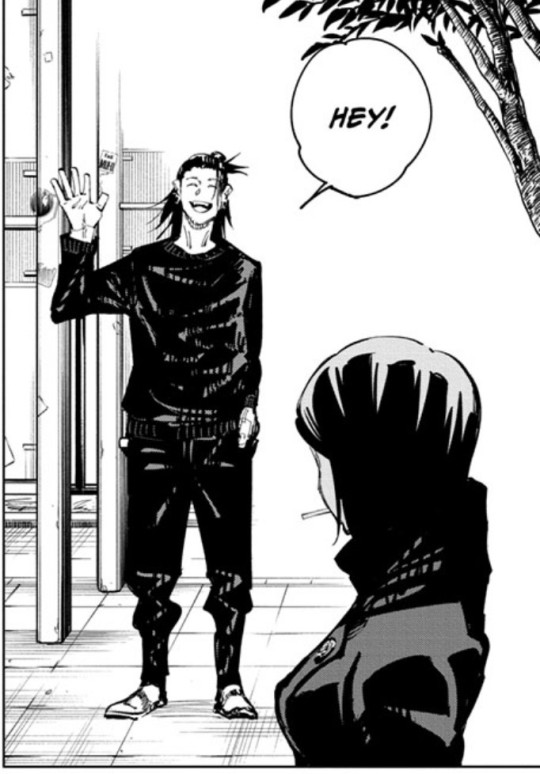

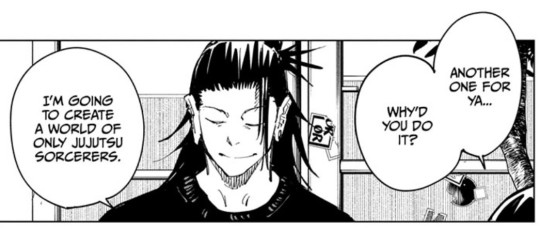
But, when Shoko calls Gojo, Geto leaves before Gojo shows up. Gojo tracks him down anyway and demands an explanation. Geto still doesn’t want to talk about it (“You already heard it.”)
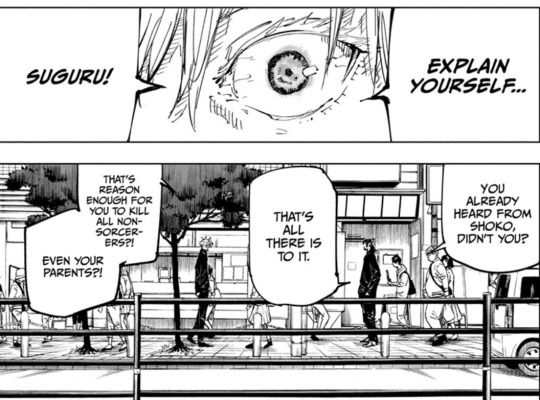
It's strange, right? Geto loves talking about his vision of a better world with everyone else.
Then, there is this confusing progression of dialog:
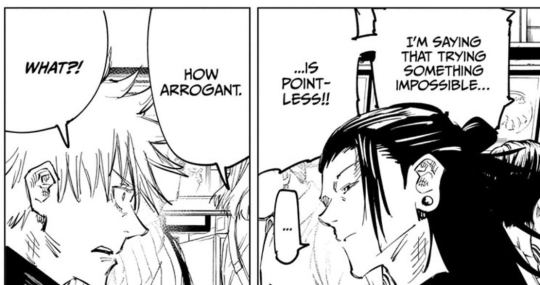
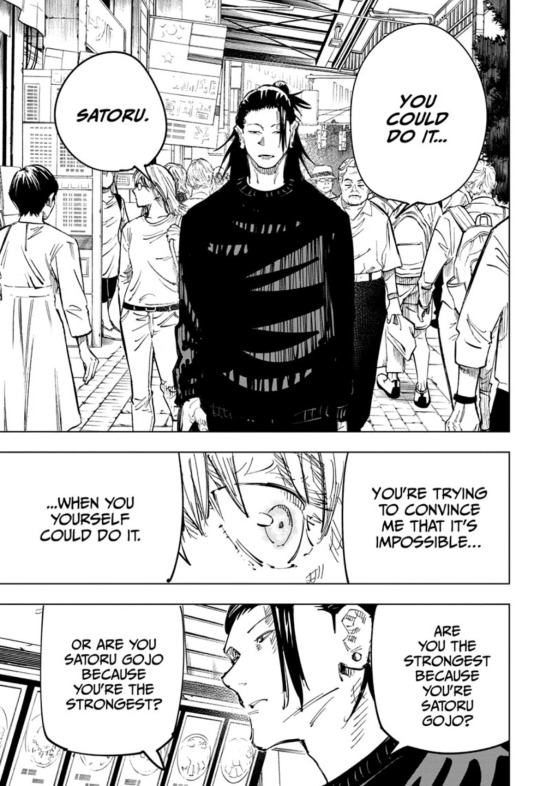
Geto is hurt/annoyed that Gojo doesn’t believe in him, so he points out that Gojo’s argument against his plan is invalid. The plan is possible (“You could do it”), therefore (according to Gojo’s own logic) it’s not “pointless.”
In a way, Geto is admitting that he knows it would make the most sense for Gojo to join him.
But before Gojo can respond, Geto pivots to saying something extremely hurtful. He's questioning who Gojo is / would be if he wasn't the strongest. Is there really anything more to him? (See more detail in my post here).
Then, in the very next panel Geto turns and starts walking away.
In summary: (1) Geto avoids Gojo, (2) Geto only argues in favor of his plan when Gojo forces/baits him, (3) Upon invalidating Gojo’s opposition to his plan, Geto immediately puts emotional distance between them, (4) Geto then puts physical distance between them.
Why is Geto trying so hard to make sure that Gojo won’t follow him?
Is he just being prideful about doing this on his own? Is he so angry at Gojo's arrogance that he'd jeopardize the success of his life's mission over it?
These arguments aren't in line with Geto's characterization / known motivations (see the end of this post, if you're interested in more on that.)
Geto's main motivation is (a twisted form of) compassion. He wants to end the suffering of sorcerers.
He is a thoughtful, contemplative person, and would've thought about the ramifications of recruiting Gojo.
What are the ramifications?
If Gojo joins the cause, Geto’s plan would succeed, but Gojo would suffer for it.
Like anyone who joins Geto's cult, Gojo would become a pariah / fugitive from Jujutsu society. He’d kill people. He’d kill other sorcerers.
But because Gojo has the singular level of strength/ability to kill non-sorcerers en masse, he would commit the vast majority (or all) of the murder / destruction. The legal, social, and mental impacts would be most severe on Gojo.
(Also, at this point, I think Geto may still question whether he’s made the right choice. It’s difficult to go from a hardline stance on protecting non-sorcerers to wanting to gen0c1de them, within the span of a year, without any lingering ethical qualms. So he may be worried about moral costs to Gojo as well.)
Let’s remember that Geto (canonically) deeply loves Gojo. Gojo is his one and only best friend. Geto worries about Gojo when he overworks himself protecting Riko. Geto is shocked when Toji kills Riko in front of him, but he only flies into a rage when he thinks Toji has killed Gojo. (Again, see my post here for more on how much Geto loves Gojo).
So, it makes sense that Geto is ready to make sacrifices to create a better world, but it’s a cost he’s willing to put on his own head. Not Gojo's.
Ultimately, Geto cares more about Gojo than he cares about achieving the mission he has dedicated his life to.
The last thing Geto says to him is this:

What he's really asking Gojo is: "Have you stopped loving me, now that I've committed myself to this dark path? Would you kill me to save them?"
If Gojo hates Geto enough that he’d kill him, then Geto never had a chance of recruiting Gojo in the first place.
Of course, Gojo can’t make himself hurt Geto. He still loves Geto too much.
Geto protected Gojo by pushing him away.
___
Addendum:
I'll also argue against two other possible explanations for Geto's behavior.
(1) Geto is jealous / prideful /wants to build his own legacy without Gojo stealing the spotlight
Geto has clear motivations for his goals and they’re not egotistical. He wants to end the suffering of sorcerers caused by non-sorcerers’ existence (e.g., Riko’s death, Mimiko & Nanako’s abuse).
Geto’s pride isn’t hurt when Gojo becomes the strongest. The only thing that bothers Geto is that they’re getting sent on separate missions.
After Gojo becomes stronger that him, Geto still has overt affection for Gojo (e.g., he asks Haibara to bring back sweets from his mission so he can share with Gojo).
Although Geto does believe in his superiority over non-sorcerers, he doesn't feel superior over other sorcerers and doesn't struggle with his 'inferiority' to Gojo.
Does Gojo’s lack of faith in Geto’s ability (calling his goal “impossible”), spur Geto to want to prove himself? Yes, probably. But Geto had already been avoiding Gojo before he said that. And I don’t believe that wanting to prove himself to Gojo would overshadow his stronger motivation to build a better world for sorcerers.
(2) He thinks Gojo actually is too moral to join him
After Geto kills the 112 non-sorcerers, Gojo is shocked and upset by what’s happened, but not once does he insult Geto or imply that Geto has done something unforgivable. In fact, he’s practically begging Geto to explain himself because he wants to be able to justify his actions. And, again, Gojo’s argument against Geto’s plan is NOT that “it’s wrong,” it’s that “it’s impossible.”
#This is what I live my life by 100%#I will not be convinced of any other truth#satosugu#jjk#jjk analysis#jujutsu kaisen#gojo x geto#gojo satoru#geto suguru#stsg#gego#goge#satosugu analysis#jjk manga#jjk canon#satosugu canon#jjk meta#satosugu meta#sugusato#my jjk thoughts
924 notes
·
View notes
Text
JJK 266 & Megumi's Childhood
i wanted to talk about megumi and his childhood for a bit, and how it ties into what happened in the most recent chapter, specifically the reasoning behind why yuuji's "i'm so lonely without you, fushiguro" was so moving for him.
i sincerely believe that everything about megumi and the way he acts can be traced back to being abandoned as a child, and i have a lot to say about this that doesn't pertain to this chapter, but that's for another post. for now, i want to talk about the logic megumi adopted to explain why he'd been left behind as a child, and how that carries through to 266.
the elephant in the room first: this is not a safe space to defend toji. you can say whatever you want about him "loving megumi," but it doesn't change the fact that he wasn't a good father, and he was never around for megumi. he gave megumi the first of many wounds, the one that megumi built his whole sense of self around.
what brought this up for me is this line that megumi shares to yuuji after yuuji has made contact with his soul in 266.

i've already talked a bit about how i don't think this should be taken literally (you can read my full thoughts here), but to paraphrase: megumi isn't saying they are literally walking side by side, rather that he holds them to the same level in his mind, and he wants to see them achieve peace and happiness. it's also implied by the "seeing off" part that he is standing back and watching this happen. he isn't a part of said peace
in that post, i touched on the way megumi is always willing to shoulder the burden of being a "bad" person when it comes to tsumiki and yuuji, and how that relates to this line, but for the sake of this post, i specifically want to draw the comparison between this line, and what megumi says to gojo in ch79 when talking about his dad.

he assumes that when toji and tsumiki's mom leave them behind, it's because they're going on to live a happier life without the kids. he adopts this mindset at a very young age, and with the previously mentioned line, we can see how it's carried through until now.
megumi has internalized the idea that he's nothing but burden that drags other people down. his young mind couldn't come up with any other explanation. he thinks he's the dead weight that's been cut in order for toji and tsumiki's mom to achieve happiness, so he believes that no one can be happy as long as he's around.
he also comes to accept that he will always inevitably be left behind. he assumes that everyone will outgrow him and move onto something better, so he lives in anticipation that he will be abandoned again eventually, hence, it is natural for him to envision the two people that matter the most to him needing to leave him behind to achieve happiness.
enter: yuuji.

he basically outright rejects the idea that he would be happier without megumi around. he tells megumi directly, "no, i'd be lonely without you." and he says this to child megumi, the one who only knew the feeling of being left behind and the idea that everyone else would be happier without him.
this is what pushes megumi to finally fight back, because he realizes his life actually is worth something to someone. he sees that him being gone won't make the people (or uh. singular remaining person) he cares about happy.
#jujutsu kaisen#jjk#jjk meta#jjk spoilers#jjk leaks#jjk 266#megumi fushiguro#fushiguro megumi#toji fushiguro#fushiguro toji#itadori yuji#yuji itadori
268 notes
·
View notes
Text
i saw an incredible post on tiktok and i wanted to expand on it, because it's genuinely amazing. all the credit to @noesbf on tt for the idea that inspired these thoughts.
geto's character is threaded through with motifs of consumption. he takes things in, whether they be curses or daughters, and is spurred by intense empathy that ends up going in the "wrong" direction once he takes the entire jujutsu world under his wing.
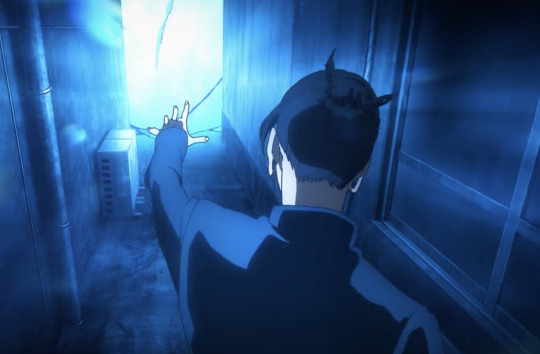
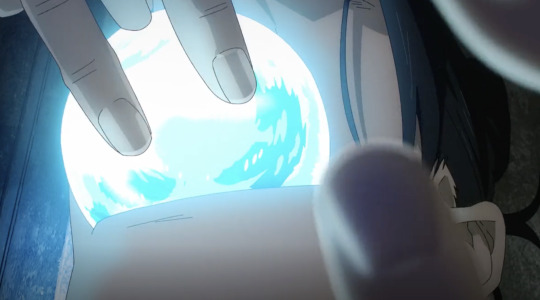
when we're introduced to him in hidden inventory, our first glimpse is of him consuming a curse. he's also alone, in a dark alleyway, a symbolic image that parallels his journey throughout the story. he's a consumptive force, a facet of his being that ultimately leads to his undoing because he consumes the responsibility of "saving" the strong, who are burdened by the weak.


gojo, on the other hand, repels. he's an outward force, extending out a physical barrier that creates distance between his body and the world. where geto invites, gojo rejects. their abilities are constructed as diametrically opposed to one another's.

through the motif of gojo's abilities, this image captures their consume/repel dynamic in a singular shot. after riko's death, gojo leans into red, which repels. he focuses on growing stronger and in doing so, isolates himself from the world (and subsequently, geto). on the other hand, geto leans into blue, which aligns with the consumptive nature of his character. he harbours riko's death inside of himself and it festers, like a curse.

black holes are all-consuming vacuums. they subsume everything around them and create an inescapable vortex— once you're pulled in, you're never getting out. it will literally eat you and in doing so, makes you an everlasting part of it.

white holes, on the other hand, function in opposition to black ones along the same axis. where black holes pull, white holes push. nothing can enter them; they're doomed to a lonely eternity because of the force that holds the universe at a distance. nothing outside of it can affect what goes on within, yet it affects everything around it.
however, white holes can be subsumed by black holes. while nothing can enter them, if a white hole were to cross paths with a black hole, its consumptive force is so powerful that it would eat them too.

after geto and gojo experience a rapture in their relationship, gojo withdraws from the world, holding everyone at a literal and figurative distance. yet, even while he's alone, he's endlessly drawn towards geto. his eyes are bound but his soul isn't— it's tied to the piece of him inside of someone else, and gojo visibly feels the pull.
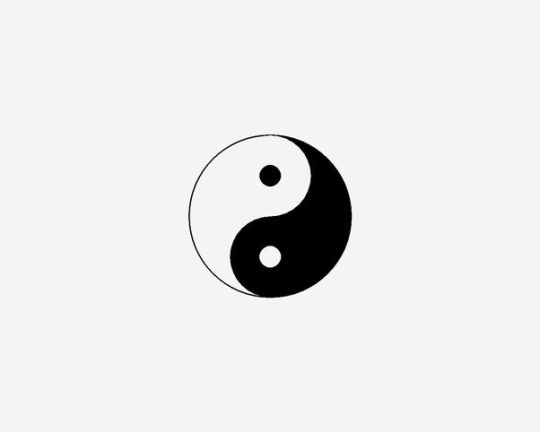
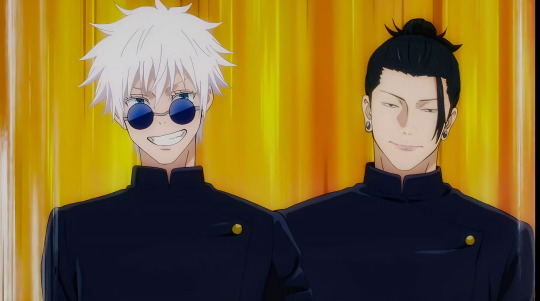
white/black holes also correspond to the colours associated with gojo and geto's characters (they align with their yin/yang dynamic, where yin (black) symbolizes darkness & the moon and yang (white) symbolizes light & the sun).
yin/yang are more than two halves; they form an indivisible whole. they become one another: light turns to dark, the moon replaces the sun in the sky, life transitions into death only to be born as life again.
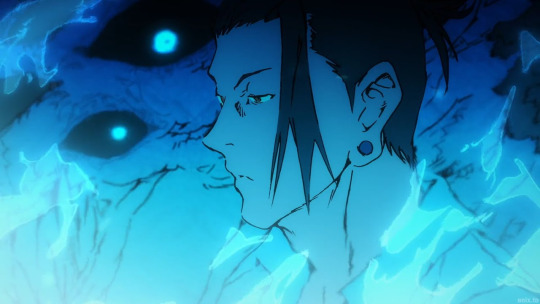
if two celestial bodies exert oppositional forces upon each other, they function in equilibrium. geto's consumption was growing alongside gojo's repelling, reaching an event horizon when he took the lives of 112 villagers and forcing the two of them out of equilibrium. he continued to consume (curses, money, vulnerable people through his cult) until he died and took gojo's soul with him.
consumption can only exist if there's a repellant force pushing back. geto and gojo are not opposites, instead, they each contain the other— every yin has yang within it and vice versa.
they are borne of each other, they are unknowable without the other. they are more than matching; together, they are complete.
#my jjk meta#this is kinda all over the place but hear me out lmfao#jjk meta#jjk#satosugu angst#satosugu analysis#satosugu meta#jjk angst#jjk analysis#gojo and geto#gojo angst#gojo analysis#stsg angst#stsg brainrot#stsg#satosugu#gojo satoru#geto suguru#satoru x suguru#geto#gojo#jujutsu kaisen meta#jujutsu kaisen analysis#jujutsu kaisen angst#jujutsu kaisen#geto angst#geto x gojo#gojo x geto#jjk gojo#jjk geto
2K notes
·
View notes
Text
The way Suguru looks at Satoru has me by the neck already, but the way Satoru looks at Suguru?? Oh my god.
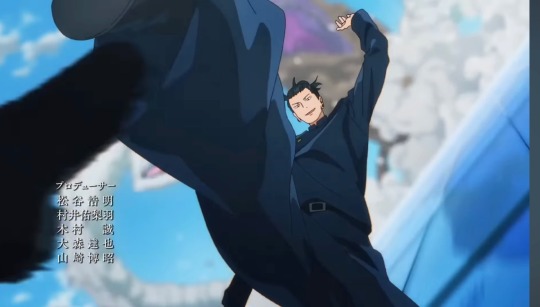


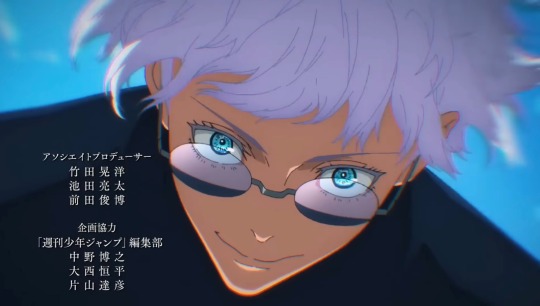
That’s his entire world right there. I don’t know how to explain it but these frames just scream “all Satoru sees is Suguru.” Like. He adores Suguru.
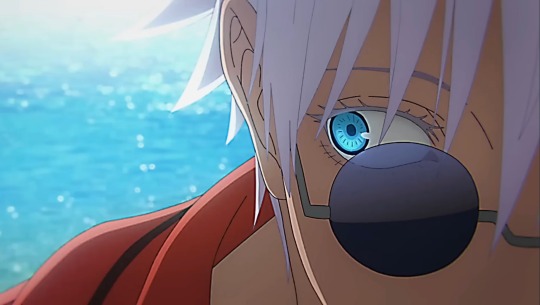
Don’t get me started on the look in his eyes when Suguru expresses his concern over his overuse of his technique. The vulnerability? The way he looks surprised, the way it looks as though he feels seen for the first time ever? There is something so tender about this. I can’t even describe it but it’s just there.

“I’m fine.”
Satoru knew damn well he wasn’t okay. No one sneaks up on him. I know he had to have been freaking out on the inside. How did he sneak in? How did I not sense him? No one gets behind me, no one is stronger than me, what’s going to happen?
But he held it together for Suguru. I feel like it’s instinct for him to automatically reassure Suguru, regardless of if it’s true or not. He schooled that expression on his face and looked so gently at Suguru…man.
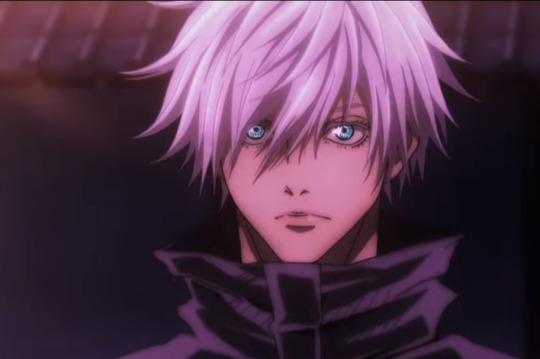
You can just see how absolutely devastated this man is in the moment he has to kill the man he loves.
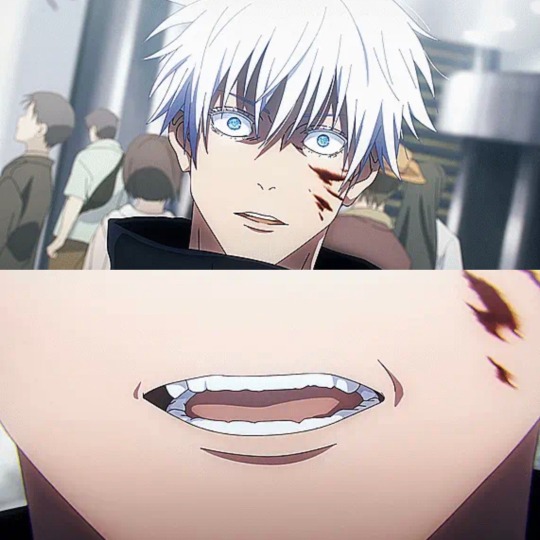
The split second he defied all logic and believed that, even though he’d killed Suguru with his own hands, Suguru had somehow survived? The elation on his face to see him one last time?

“It might be goodnight for me, but it’s about time for you to wake up.” This is the smile he had on his face before calling out to Suguru, attempting to reach into the land of the dead for him. It’s like in this frame instead of the monster inhabiting Suguru, he just saw Suguru.
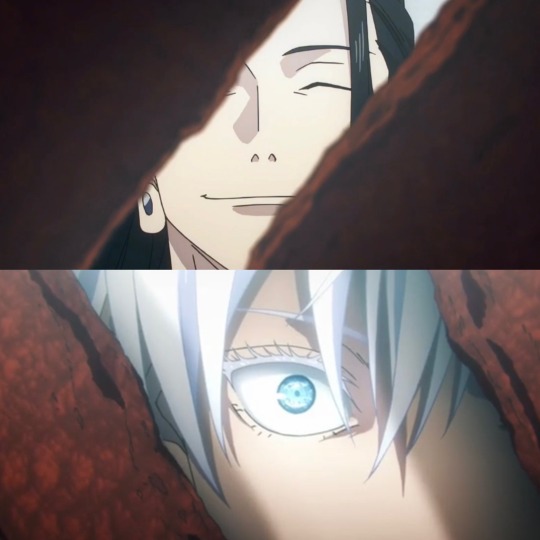
The last thing he sees before he gets sealed is Suguru’s face, smiling. I can’t imagine the anguish he must have felt here. It’s almost as if he’s clinging to it, trying to pretend that it really is Suguru. Trying to convince himself what he knows isn’t true.
Conclusion: there is no one that loves anyone as much as Satoru loves Suguru.
#i want someone to love me like that#they have the kind of love everyone dreams of#just so deep and prevailing#satosugu#satosugu meta#satosugu angst#satosugu analysis#satosugu brainrot#gojo satoru#satoru gojo#geto suguru#suguru geto#stsg#jjk meta
1K notes
·
View notes
Text
i really enjoy the contrast between jjk and dandadan's approach to the question of what it means to be human, specifically in how cursed spirits/evil spirits are perceived by the protagonists. where jjk is more philosophical and within the context of the story's universe ("humans and their inherent humanity; a clash of ideologies"), dandadan feels like a real world answer to that—within the first seven animated episodes, we've been introduced to two "big bads," both of which have been given gut-wrenching backgrounds, painfully human in a way that sobers the audience stunned. (appreciatively, i say) it gets too fucking real.
but i like the contrast in delivery and impact. where jjk reads like an almost stoic outline to a loaded question, dandadan is the raw pumping heart that colors within. mapping veins, living blood. what does it mean to be human? spirit or not, at the end of the day, it's all just human business.
#obviously there are more stories that use ghosts and spirits and the supernatural to convey human nature#but i'm hyperfocused on these two right now ^^#i wanna try and write some comparative analysis on the two because 1.) i like them both and 2.) they both deal with similar themes#in different packaging with dandadan being a romance and all#but admittedly i'm afraid of how that'll be received...considering...#rn i'm reading dandadan! but i also still have to read jjk's last chapter HAHA!#jjk#dandadan#dandadan meta#jjk meta
245 notes
·
View notes
Text
thinking about geto's original dialogue of "if you want to kill me, go ahead. i don’t mind being killed by you. just be careful to not kill anyone besides me" and how geto did not mind being a villain but he did not want gojo to turn out like him and he tried to make sure of it just like how he protected gojo from turning to dark side after riko's death. he left because he wanted to create a world gojo will not have to bear the burden of all the lives on his shoulder, he left so gojo could move on without being swayed by him or his ideologies and even if it meant being killed by gojo which is so ironic because gojo never really moved on from that incident. it cemented so deeply into his conscience that he carried the guilt of being left behind for a decade and over. geto thought his leaving would make sense and things easier while it did the quite opposite, every decision and goal that gojo took from then on always tracked back to the kfc incident, if he wasn't being tormented by geto's memory he was being tormented by the misuse and disrespect of geto's body. the before, during and after gojo's sealing all involved one main factor: geto suguru. even before shinjuku fight while preparing for the worst outcome possible he was thinking about geto and how he always had to catch up to geto because he was the who was left behind, even during his death his last conversation was with geto. both of them left such big holes in each other's lives when they were barely together for 3 years, if that isn't love idk what is.
#jujutsu kaisen#jjk#jjk spoilers#gojo satoru#geto suguru#satosugu#stsg#jjk manga spoilers#jjk manga#sugusato#gojo x geto#gojogeto#satoru gojo#getou suguru#jjk analysis#jjk meta#200#300
422 notes
·
View notes